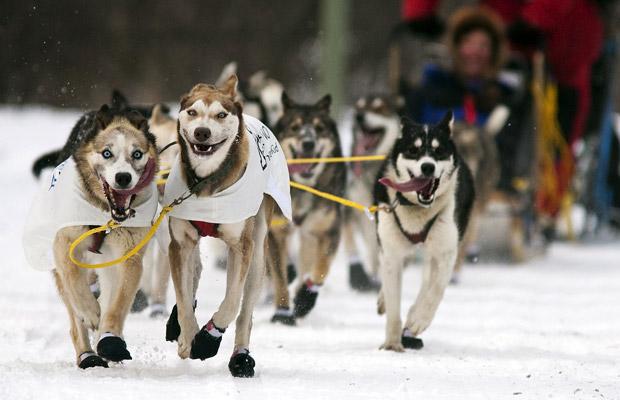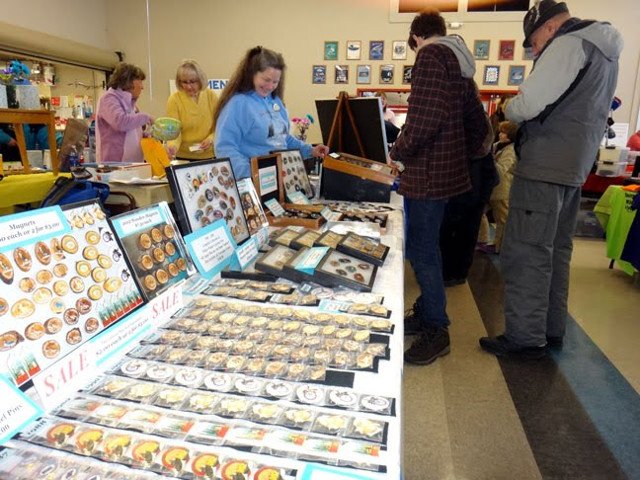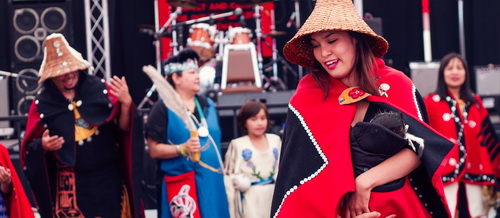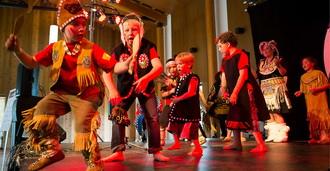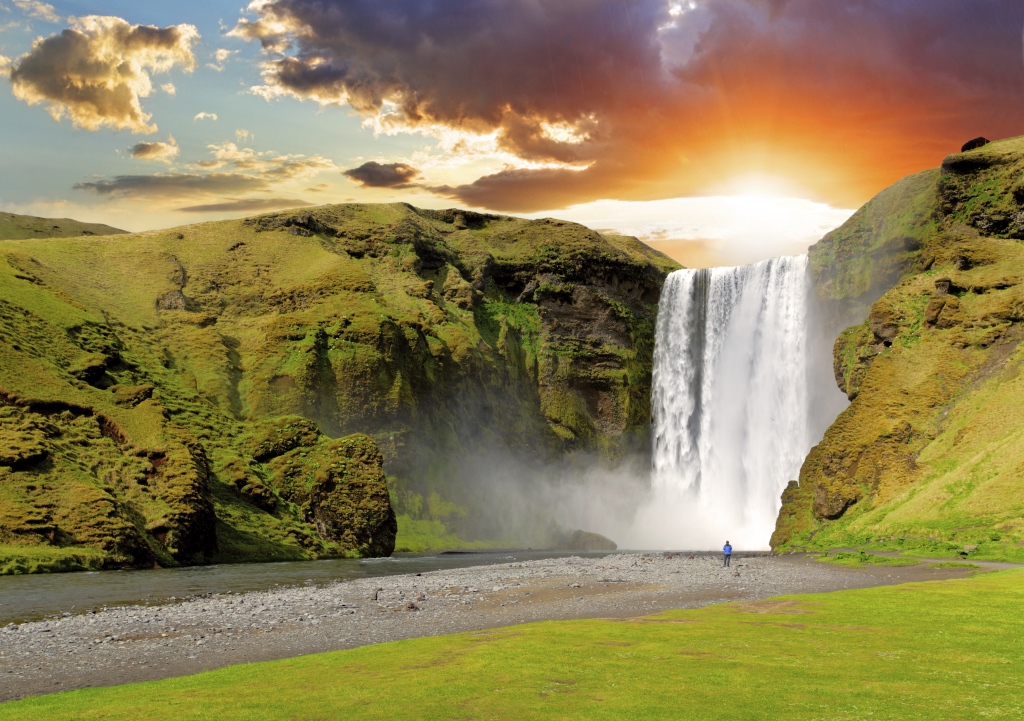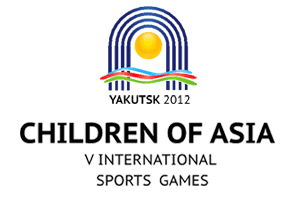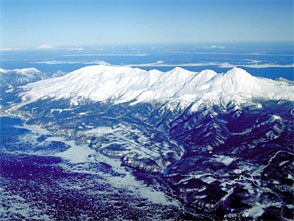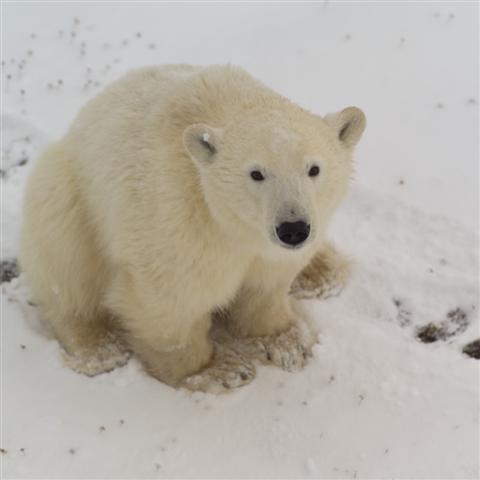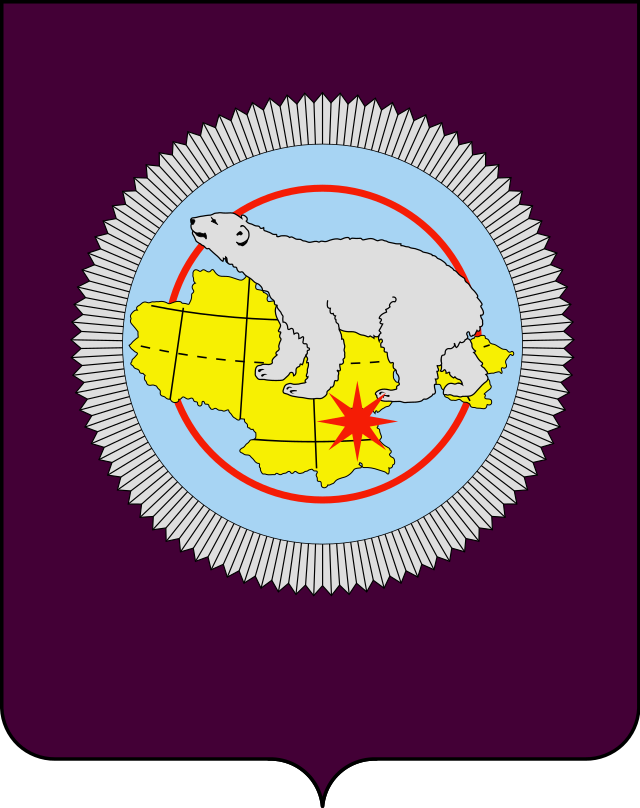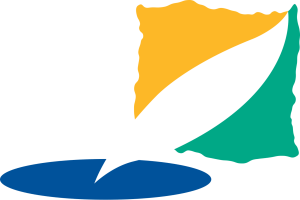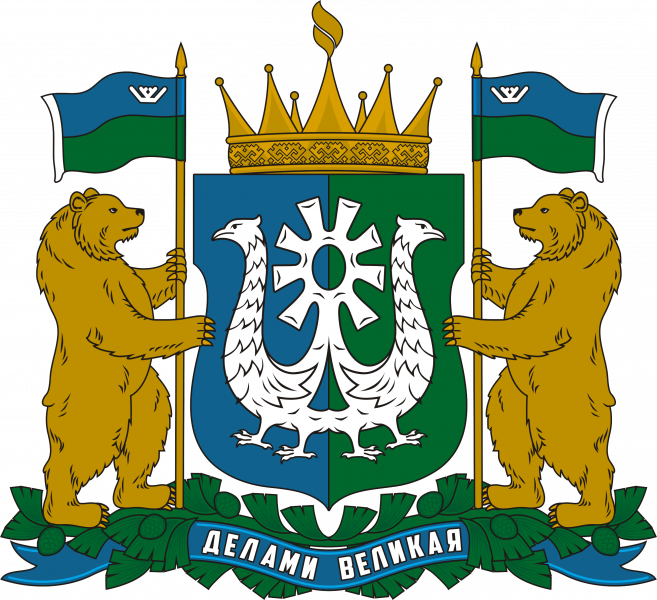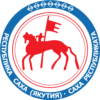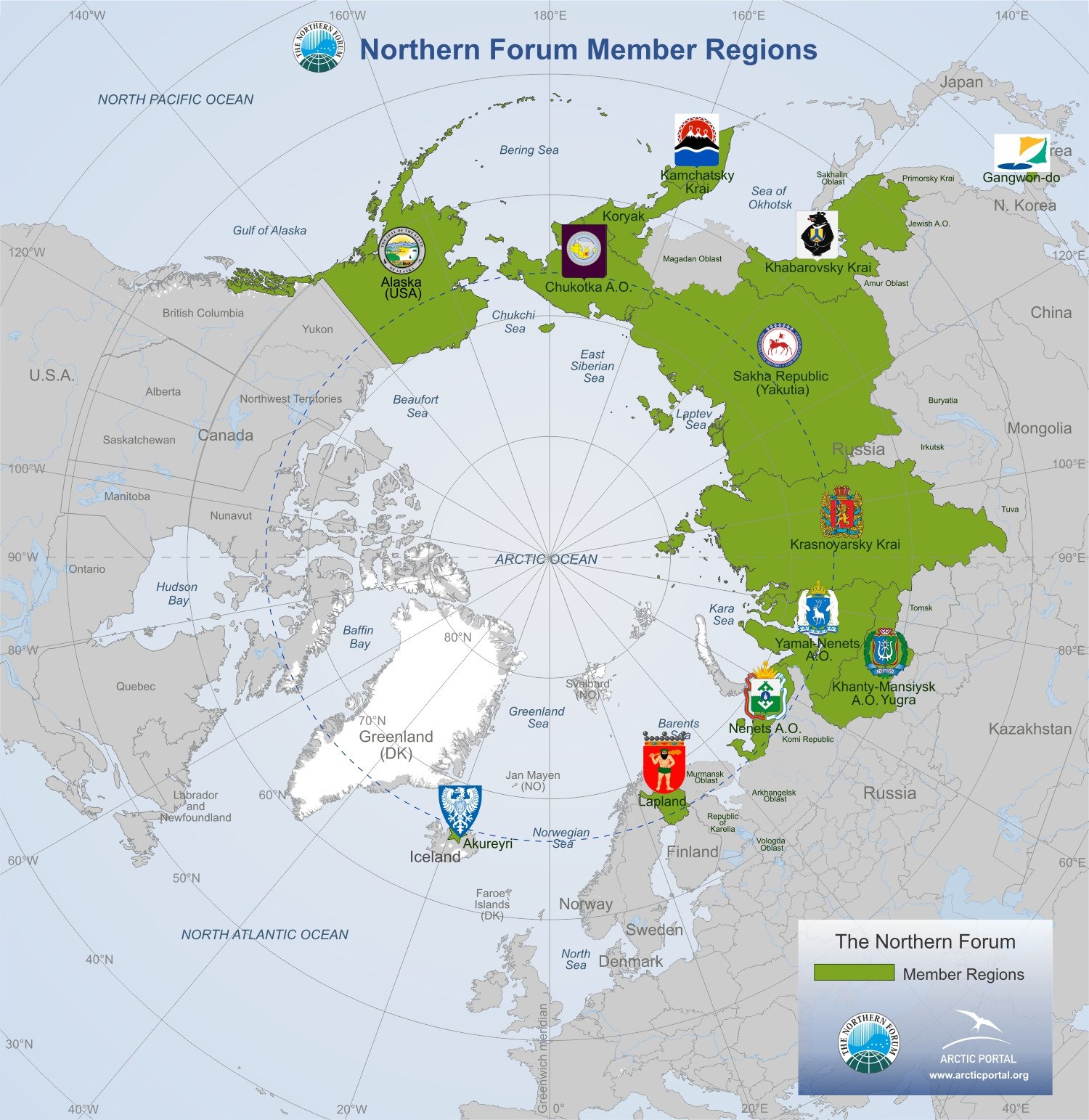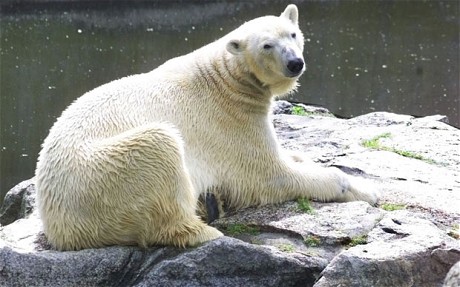Articles
The Arctic culture has a main feature with most of its ethnicities – co-existence with nature that makes human life in harsh conditions sustainable. Whether the peoples are living by fishing, whaling, hunting or even living sedate and doing farming and working for industry – careful, yet intensive use of nature deposits has its reflection in culture. Inuit – one of the biggest peoples in the Arctic, populating coastal areas of several Arctic states, have many references to relationships with nature – starting with myths of aurora and hunting rituals, ending with words in their language. Yakuts is another notable people that has strong links to the Arctic environment, despite living inland rather than on the coastal lines – tales of the North and. Nomadic reindeer herders such as Evenki or Sami, from the other side have their own way of life that is tied to reindeers and their own living routine.
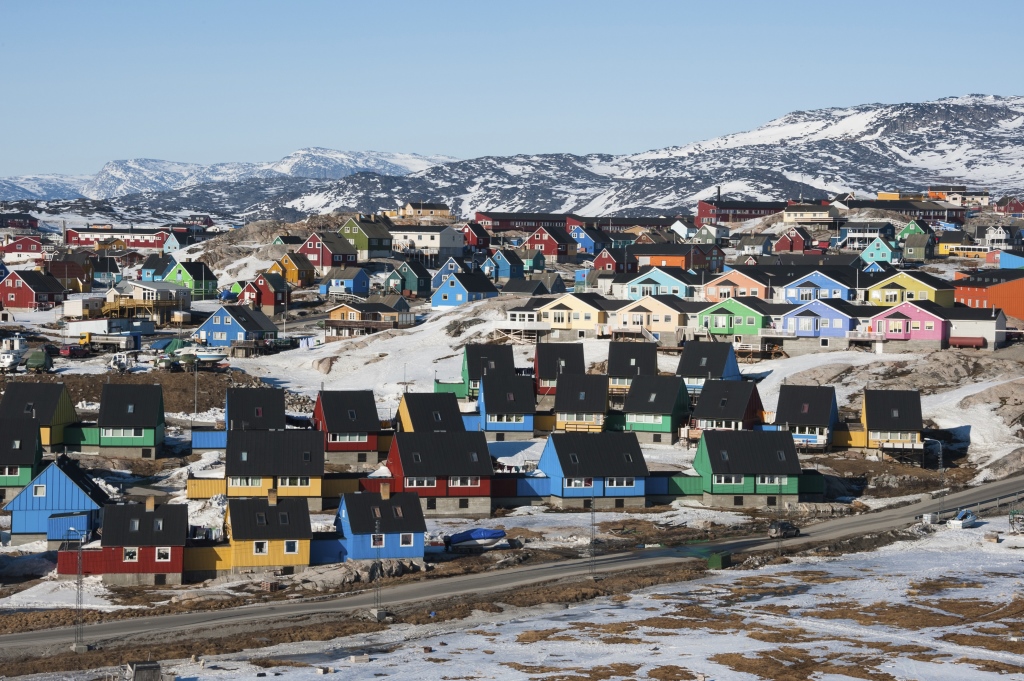 Specificity of the Arctic has its reflection on the Arctic culture – this place, as any other place in the World has universal culture events – yet, with Arctic features. For example, there is a variety of North-only film festivals, one way or another districting films about the North. These are Polar Lights Film Festival originating from Murmansk (Russia), the most Northern film festival of Europe called TIFF (held in Tromso yearly) and recently launched Yakutsk International Film Festival. Whereas these have clearly Northern attributes, the reviewed films can be either amateur, short and documentary or ones that run of the “silver screen”.
Specificity of the Arctic has its reflection on the Arctic culture – this place, as any other place in the World has universal culture events – yet, with Arctic features. For example, there is a variety of North-only film festivals, one way or another districting films about the North. These are Polar Lights Film Festival originating from Murmansk (Russia), the most Northern film festival of Europe called TIFF (held in Tromso yearly) and recently launched Yakutsk International Film Festival. Whereas these have clearly Northern attributes, the reviewed films can be either amateur, short and documentary or ones that run of the “silver screen”.
The Arctic, being a demanding place to reside hence its climate conditions, requires its residents to be perfectly fit and ready to oppose natural challenges. Therefore it is not surprising that sports play a major role in culture of the North. Sports events are popular with everyone – both indigenous peoples and modern societies; and the Northern kinds of sports are becoming increasingly a worldwide trend. There is a variety of international sports events held in the Northern Forum regions. One may know Children of Asia games held once in 4 years in Yakutsk (Russia), subregional sports contests in practically every NF region and non-Northern Forum events that engage the Northern Forum regions. Notable examples are events such as the Inuvik Northern Games held in North America since 1970 using indigenous-sourced kinds of sports and Arctic Winter Games launched by co-creator of the Northern Forum, Alaskan governor Walter J. Hickel that is a general sports contest allowing sportsmen from the Circumpolar region to compete in their home turf.
Below we listed interesting culture events that are held in the regions of the Northern Forum. We update the events every year, so that you can get a real chance to take part in these.
United States of America (Alaska)
Iditarod — is the best-known and extreme race on dogsleds, with a general extent more than 1 800 kilometers. Americans call it "the Last Great Race". Participation in this unforgettable competition attracts the most various people from around the world, from all sectors of society.
Appropriate term for sport actually "teams" which consists of sledge persons direct, along with several sets of dogs having pulled it forward. Iditarod races covers nearly 1200 miles, and can last about fifteen days. The best time was in 2002 when the winner Martin Buzer crossed the line finished slightly less than nine days.
Imagine mountain tops, a taiga, the desert tundra and the frozen river. Add to it the negative temperatures and blizzards causing total loss of visibility, and you receive Iditarod — outstanding race on dogsleds, possible only on Alaska.
Races Iditarod will take place on the first Saturday of March every year. Nevertheless, guests who want to catch to finish it is necessary to plan the trip at the end of race. It, as a rule, in nine days after the beginning on Saturday. To the seventh or the eighth day, is the general opinion, approximately, when the winner will be crossings of the finishing line.
This annual winter festival, in existence for more than 50 years, is held on back-to-back weekends at the end of January and beginning of February. With the state’s biggest winter fireworks display, $1,000 bingo cash pots, sled dog races, talent contests, foot races and fat-tire bike races, the festival is a regional draw and a fun place for travelers to see Alaskans cut loose.
The carnival kicks off with a dinner at the community center, where 250 people feast while a dozen artists do a “quick draw.” In under an hour, they’ll paint or sketch creations that are then auctioned off. Other highlights of opening night include fireworks, as well as mushers drawing positions for the dogsled race
That’s just one of many races, which range from competitive to goofy. But perhaps the funniest event is held on the second weekend: the “Talent or Not” contest. Singers, jugglers, fire twirlers, and more take the stage to show off their skills (or lack of them). www.waco-ak.org
The picturesque town of Atlin holds its annual arts and music festivals for up to 2,500 people for just three days of the year. It boasts a diverse musical lineup and fun for both children and adults. Participate in art & music workshops & demos, artist exhibitions, comedy, dance & storytelling.
In addition to a stellar roster of performances and film screenings at the Globe Theatre, marthoners can partake in the Atlin Mini-Marathon scheduled during the festival.
Advance tickets are advisable as camping sites and accommodation fill up fast!
Fairgrounds & Festivals
Jul 10, 2015 - Jul 15, 2015
If you’re visiting Alaska between May and August, you're pretty much guaranteed to stumble across a celebration. Fairs, of course, offer an all-ages crowd-pleaser, with good food, entertainment, and no doubt some quirky Alaskan tradition that started it all. The Alaska State Fair (in the Mat-Su Valley, about an hour north of Anchorage) is the biggest festival of the summer, taking place from the end of August through early September. While the celebrations slow down during the colder months, they certainly don’t stop. One of the most beloved festivals of the year—and the largest one during winter—is the Fur Rendezvous (also called Fur Rondy), which turns Anchorage into a big snowy party every February.
Alaska Folk Festival
The Alaska Folk Festival is an annual celebration of music by folk from Alaska, the Northwestern United States, Canada, and further. It is held in Juneau, Alaska, most commonly during the second week of April.
It includes performances from a wide variety of solo artists and musical groups, and it provides workshops for people interested in the music. There are also dances, jams, singer/songwriter showcases and other events. All events are free to the public. This festival is supported solely by volunteers and donations. There are no auditions for the acts, anyone can apply. Each act is 15 minutes long. There are 9 concerts over 7 days with about 15 acts in each concert.
Each year we hire one Guest Artist group. They are contracted to play two 45-minute sets on the main stage, sometimes a dance set, provide workshops, and jam with folks around town.
The only limitation on musical style is the 15 minutes allocated for each act. Since the setup time must also fit into the 15 minutes, complicated setups are not a good idea, and may not be allowed. Performers include poets and dancers as well as musicians.
The 41st annual Alaska Folk Festival is scheduled for April 6-12, 2015.
CANADA (Yukon)
 Yukon Sourdough Rendezvous Festival
Yukon Sourdough Rendezvous Festival
Feb 18, 2015 - Feb 22, 2015
Celebrating Yukon’s tenacious, frontier spirit
For a week in February, Whitehorse buzzes with energy that brings Yukon’s heritage alive and heralds the coming of spring. Enjoy family-friendly and sporting events by day like the pancake breakfast, axe throwing, dogsledding, flour packing and chainsaw chucking. At night, the raucous fun gets in full swing with Sourdough Sam competitions, crowning of the festival Queen and roving performances by the world-famous Snow Shoe Shufflers and Rendezvous Can Can dancers.
Crane and Sheep Festival
One of North America's most spectacular migrations of the Sandhill Cranes! At the beginning of May, Sandhill Cranes migrate to nesting grounds in western Alaska and North-eastern Siberia. Visitors can see the birds funnel through the Yukon's Tintina Trench, swooping, soaring and riding thermals right over the Town of Faro. The festival also showcases Fannin sheep, tours of the area, natural history talks, and family entertainment.
The Adäka Cultural Festival was launched in July 2011, with a mission to develop and deliver a world-class, iconic festival that showcases, celebrates, and fosters the development of Yukon’s diverse and distinctive First Nations arts and culture. The Festival is committed to shining a light on the creative spirit of Yukon First Nations people, helping to preserve and revitalize our arts and culture, while inspiring artists and youth to take pride in their heritage and communities. Each year the Festival hosts over 150 artists and features a vibrant schedule of traditional and contemporary performances, artist demonstrations, an art market & gallery, workshops, cultural presentations, films, community feast, and more!
Commissioner’s Tea and Klondike Ball
The regal Commissioner's Ball at Dawson City's renowned Palace Grand Theatre. Get decked out in all your finest and step back in time. Held each year in recognition of our territory officially joining the dominion of Canada, this event draws Yukoners and visitors from far and wide. Dress is formal and many take the opportunity to dress in the styles of 1898. A tea is held during the day at the Commissioner's Residence. A ball takes place at night with great food, potable spirits and dancing.
National Aboriginal Day in Dawson
On June 21st the Dänojà Zho Cultural Centre situated in downtown Dawson City, celebrates National Aboriginal Day with outdoor events including the Hän Singers, live contemporary music, tours, activities, refreshments and an opportunity to visit our heritage galleries. Aboriginal Day has been set aside for all people to recognize, celebrate and learn more about the Tr’ondëk Hwëch’in First Nation and Aboriginal culture and heritage in Canada.
Yukon Sourdough Rendezvous Festival
For a week in February, Whitehorse buzzes with energy that brings Yukon’s heritage alive and heralds the coming of spring. Enjoy family-friendly and sporting events by day like the pancake breakfast, axe throwing, dog sledding, flour packing and chainsaw chucking. At night, the raucous fun gets in full swing with Sourdough Sam competitions, crowning of the festival Queen and roving performances by the world-famous Snow Shoe Shufflers.
A Celebration of Swans
Every spring, migratory birds descend on the Yukon en masse in a beautiful display of nature at its finest. The Celebration of Swans is the territory’s premier bird festival, highly anticipated by locals and visitors alike for the sight of thousands of Trumpeter Swans in their natural habitat. Families, visitors and serious and casual birders flock to Swan Haven in Marsh Lake and other viewing areas in southern Yukon to take in the spectacle and join special events
ICELAND
Grímsey Day is an annual fest focusing on old traditions and takes place at the beginning of June each year. Grímsey Festival comes to collecting eggs, boat tours, childrens games, seek out the eggs of the Artic Tern, enjoy seasonal local food, music etc. The event takes place over the weekend 30th of May - 1st of June.
Grímsey is situtated on the Arctic Circle 41 kms off the North coast of Iceland. The present population is around 90 inhabitants. The island offers the visitors a wonderful scenery and birdlife. You can fly or take a ferry out to Grímsey.
Medieval Trading Weekend at Gásir
The Medieval Trading Weekend 2014 will take place on the 18th - 20th of July.
Each summer the medieval market event provides daily demonstrations in medieval crafts and games.
The villagers are dressed in medieval costume and can be seen demonstrating old nordic crafts; spinning wool, wood carving, tanning, black smithing and much more. Shows of medieval sword fighting are held on each day of the festival and members of the public can join in with medieval ball games and archery. Refreshments are availble and traditional lamb soup made with icelandic herbs is on sale.
Fish Festival in Dalvík
The Great Fish day is an annual festival in Dalvíkurbyggð held the first or the second Saturday in August. Fish producers and other members of the society invite guests to a sea food buffet between 11:00 and 17:00 at the harbour in Dalvík. The reason for this generous offer is to get as many people as possible together to taste fish and enjoy a good day in Dalvík. The Great Fish Day has been a very successful event and during the first eight years, a total of 200.000 guests have taken part in this fabulous village feast. Guests have also enjoyed a great weather in all those years. While enjoying the free fish guests can enjoy various entertainments at the harbour. Every year there is a versatile menu with new dishes on offer.
Arctic Open
This international golf tournament takes place 26th-28th of June 2014 around Summer Solstice. The northernmost golf course in the world hosts the Artic Open yearly.
It is an international event which attracts golfers from various parts of the world. Highest number of international players so far is 120 participants.
A game of midnight golf seems an unlikely prospect to many enthusiasts and few golfers have experienced this delight. But now you have a novel opportunity to participate in an event which features round the clock golf in mid-summer at high latitudes.
Republic of Korea (Gangwon Province)
Hwacheon Sancheoneo Ice Festival
Jan 3 to Jan 25, 2015; www.narafestival.com/01_icenara; Hwacheon Stream area
The Hwacheon Sancheoneo (Mount Trout) Ice Festival will be taking place in Hwacheon in Gangwon-do. This virtually untouched region is known as the first area in Korea that freezes over in winter, and the river is covered with a thick layer of ice.
Visitors can try out ice fishing, and those who are feeling brave can try to catch mountain trout with their bare hands in this festival.
The Chuncheon International Mime Festival
24.05.2015 - 31.05.2015
The Chuncheon International Mime Festival presents a wide array of performances by hundreds of performing arts teams from Korea and abroad. Chuncheon is easily accessible by public transportation, and also offers easy access to other popular tourist attractions like Namiseom Island and Soyangang Dam.
Hyoseok Cultural Festival
09.2015
Hyoseok Cultural Festival is held to commemorate modern Korean writer Lee Hyo-seok and his popular novel ‘When Buckwheat Flowers Bloom,’ which demonstrates the connection between human life and beauty of nature through the dazzling scenery of Bongpyeong. In fact, Bongpyeong is the author’s hometown, and appears frequently in his novels.
The Festival offers various participatory programs such as poem exhibition, literature night, Hyo-seok essay contest, nature experiences (e.g. fingernail coloring using balsam), buckwheat food cooking, and many more. Furthermore, visitors may tour Lee Hyo-seok’s birthplace and memorial hall.
Goseong Myeongtae Festival
29.10.2015 - 01.11.2015
To ensure a good haul and community prosperity, this festival is held at Geojinhang Port, known as the primary place of Pollack fish in Korea. The festival includes numerous hands-on events such as a sea festival, a cultural festival, and a local culture experience.
The festival has helped the city to promote their local seafood, farm products and other specialties, thus contributing to the growth of the local economy.
JAPAN (Hokkaido)
Rising Sun Rock Festival
The Rising Sun is a Japanese rock music festival in Ezo (Ezo is Hokkaido in Ainu language)and is held every summer at a special outdoor site; Tarukawa Wharf of Ishikari bay new port, only about 40 minutes by car or bus from Sapporo JR station.
The festival is usually around August 12th or 13th and always on a Friday and finishes on the Sunday morning, just after sun rise, hence, the name of the festival.
The Hokkaido Shrine Festival
In the evening there is a festival with many Japan food stalls, horror shows and some carnival games, such as “hit the coconuts”. The festival is held in the beautiful Nakajima Park, a short subway ride from Sapporo Station. This is probably the busiest festival I have ever been to in my life, busier than any music festival because the pathways in Nakajima Park are very narrow so it gets very congested very quickly. I was at a standstill every five minutes when walking through.
The Hokkaido University Festival is held every year for about four days in early June. The main campus road area is closed to cars and transforms into a carnival. The entire main Hokkaido University street (about 400m long) is lined with food stalls. On a regular day this beautiful road is lined with huge gingko trees and is a popular tourist attraction, especially in the autumn when the leaves change to reds and yellows.
Hokkudai Festival
During the festival one half of the street is filled with stalls run by the students of the University selling cheap, festival, Japan food, such as yakisoba (fried noodles), yakitori (meat on a stick), Zangi (fried chicken) and other easy to make festival food.
All the food is sold at very reasonable prices but the quality is not great, as it is made by students. All the way down this street, you will hear students shouting and heckling trying to entice potential customers to their booths.
Japanese Dance at the Yosakoi Festival
Yosakoi is a Traditional Japanese dance that started in the city of Kochi in 1954. The dance is usually performed in large groups ranging from 20-50 people choreographed to music with the dancers wearing colourful outfits.
The participants are a mix of people from yosakoi dance schools and local dance teams with men and women of all ages. One year I saw a dance group of elementary school children and they were sooooo cute. I also saw a group of seniors that were amazing! They had colourful make up and I didn't realise their age until i was up close. Their dance routine was a bit less energetic than the other dance groups, but the synchronisation was spot on. Yosakoi means "come at night".
The Otaru Snow Light Path Festival
Otaru near Sapporo Japan has its own snow festival and if you want to get away from the huge crowds and busy atmosphere of the Sapporo Snow Festival this is worth a visit.
There are various kinds of ice candles made by citizens of the city and can be seen along the canal and shopping streets, all within walking distance from the JR train station. It is one the most beautiful Japan festivals in winter and very romantic
The Sapporo Snow Festival
The Sapporo Snow Festival showcases the biggest and most beautiful snow sculptures in the world and takes place every year at the beginning of February in Odori Park. The people of Sapporo go to see them during the first couple of days. The first day is the best when the sculptures have been freshly made and glisten in the sun. After that they begin to melt and get dirty. About 2 million people visit Sapporo every year to see the hundreds of ice sculptures at the Odori Park, Sususkino and the Satoland sites, so it gets really hectic. Every year there is a different theme for the sculptures based on special events, famous people or topics that were popular the previous year.
RUSSIA - Chukotka (Chukotskiy AO)
Feast of the Polar Bear
Winter-spring
The history of the peoples of Chukotka is rich in various kinds of traditions and rites, born of the observation of nature, the life of animals and dedication deer hunting season or the beginning or end. Feast of the polar bear was accompanied by interesting ritual actions: Thanksgiving ritual, the performance of the best dancers and other activities.
Feast of Keretkun
Time of usually associated with the fishing season.
Keretkun - is the name of the spirit, which express wishes and requests. This spirit - the main protagonist in the ceremony. Perform the ceremony, put a few zhirnikov above them hung boiler, which is cooked food. About zhirnikov kindle a fire. He serves as a ritual of presenting food. One of the most important design elements yaranga the holiday is Keretkuna network, which is described in detail in VG Tan Bogoras: "Network woven from tendons. It is hung under the smoke hole of the tent. Often used a pole to maintain it. The network is spread horizontally, and each end of her straps tied to the walls of the tent. Network hung with pictures of birds and small toy paddles painted blood seal . The number of oars comes to a dozen. Busin much smaller. The birds are made of wood and decorated with very rough strips. On the pole sticking out of the smoke hole, attached a wooden image of a seagull ... ". During the holiday spend feeding network, spirits and express the wishes and requests
Feast of whale
One of the most exciting holidays of indigenous inhabitants of the coast of Chukotka (Chukchi, Eskimos). Held in the coastal towns (Lawrence, Wellen) in late August, September.
Usually on the eve of the whole village met the canoe with messengers who had brought the news of the mined whale and emergency meeting with the brave hunters. Runners are invited to the ritual fire, treat. The hunters talk about how the past hunting, canoe whose first harpooned whale. Then, on the shore waiting for the canoes with a harpooned whale. Hunters in canoes reaching the shore in greeting raise oars. girl meet arrivers with a ritual wooden dishes, accompanied by a woman who is the keeper of national traditions. At the end of the towing whale woman misled him the girl to perform the ritual drinking of sea animals. Hunters tray spear-shaped blades, and they cut out pieces of whale skin (itgilgyn), cut into thin plates, laid out on a wooden oval dishes and portrayed the boys - future hunters. On the second day, the team baydarnoy come to a thanksgiving ceremony. Place for it is covered with walrus skins. Out of blocks of snow piled wall behind the platform. Strengthen two-meter vertical stakes, they set horizontally on two oars in the back of the - steering wheel canoes - a symbol of canoes on land. The rite begins with the cry of "O-ok-ok". "The circle of women go out with her braids in the headbands of white ermine skins, gloved in white mandarka (tanned skins without a seal coat) with ornament and furry. Women dancing sedentary dance depicting hunting whale. Then sedentary dance performed by hunters. The climax of the song and dance was considered competition. The best performers received prizes.
Celebration in some villages narrators includes competitions for the best knowledge of tales about whales, stories of experienced hunters and interesting cases on the hunt, instsenirovanie tales, sporting events, starting with the traditional racing canoes.
"Smelt Festival"
Spring
"Smelt Festival" has been held since the early 1990s as a regular contest amateur fishermen, and now has become a favorite holiday northerners and the biggest spring show in Chukotka. To "Korfest" attracts national, folk ensembles, masters and carvers bring their products and organize the exhibition and sale. There is a possibility of national dishes prepared by Chukchi recipes, cooked on a fire in yaranga - Traditional accommodation Chukchi
RUSSIA - Sakha Republic (Yakutia)
Ysyakh is Sakha celebration of the summerThis spring-summer festivity honors the deities Aiyy and the rebirth of nature, accompanied by ritual prayers, plentiful refreshments (traditional mare milk drink “Kumys”), dances, traditional games and horse racing. The national holiday, which marks the completion of "Dyl" (last year) and the beginning of a new "Syl" (New Year), the completion of the annual economic cycle. In 2012, the city-based Ysyakh held a World record for the number of traditional round dance, which involved 15293 people in national costumes.
Children of Asia
Originally started in 1996, Children of Asia became the first pan-Asian Olympic-style sports games for children. Since then, five games were held in Yakutsk, with the 6th coming along in 2016 – same year as the next Summer Olympics. Number of sports has grown from a few to 25 – those include different kinds of athletics, traditional ethnic sports, and other typical summer Olympic sports. After the 5th anniversary games, the event granted the International Olympic Committee patronage, which raised awareness and status of the games.
Yakutsk International Film Festival
For the last few years, Youth of Sakha Republic started to get very interested with movie making. Rise of number and quality of domestic-made professional, amateur and art films gets steeper to an extent that Russian Federal media began comparing Sakha moviemaking scene to “Bollywood” of India. Local movies make profits at domestic theatres comparable to those of high-dollar blockbusters from Hollywood and more than Russian-made movies. This atmosphere has become a solid ground for the Yakutsk film festival that was first held in 2013. Participants have viewed Arctic-themed films either coming from the Northern regions of Earth or telling about this particular region. As this festival was a success, 2014 and years after that are promising to boost growth of this event gradually. 2014 Festival is to be held in Yakutsk in late August 2014.
RUSSIA - Yamal (YNAO)
Reindeer Herder's Day
February 1-April 30
Annual national holiday celebrated in all municipalities of Yamal. In these days before numerous guests creative teams of Autonomous Okrug perfomance. As part of the celebrations competitions in national sports, sled dog races, demonstration of clothing, a competition for the best female harness, game programs for children and much more are planned.
Day of the reindeer herder on the Yamal Peninsula has become the hallmark of the region in the field of tourism. Colorful celebration, showing the strength and agility of Yamal herders, skill tent-housewives, their hospitality and the breadth of the soul - an integral part of the event and eco-tourism on a Yamal.
The Environment program consists of several projects one way or another concerning environmental issues. For the Northern Forum history, involvement in this program has been steadily growing according to growing challenges in the Northern environments.
Current Environment projects are: Northern Zoos Cooperation, Youth Eco Forum, Water & Climate Change working group and Brown Bear working group. Northern Zoos Cooperation is a strong project that has been active for a while in bringing zoos of the North together. Youth Eco Forum is an event project of a completely different nature - being an educational forum for school students, aimed at drafting resolutions on top eco problems of the North. Water and Climate Change WG is a research working group dedicated on studying effects of water floods; and in a similar manner, the Brown Bear WG is a scientific research group - but with an aim of making co-existence of humans and brown bears in the Northern communities safe.
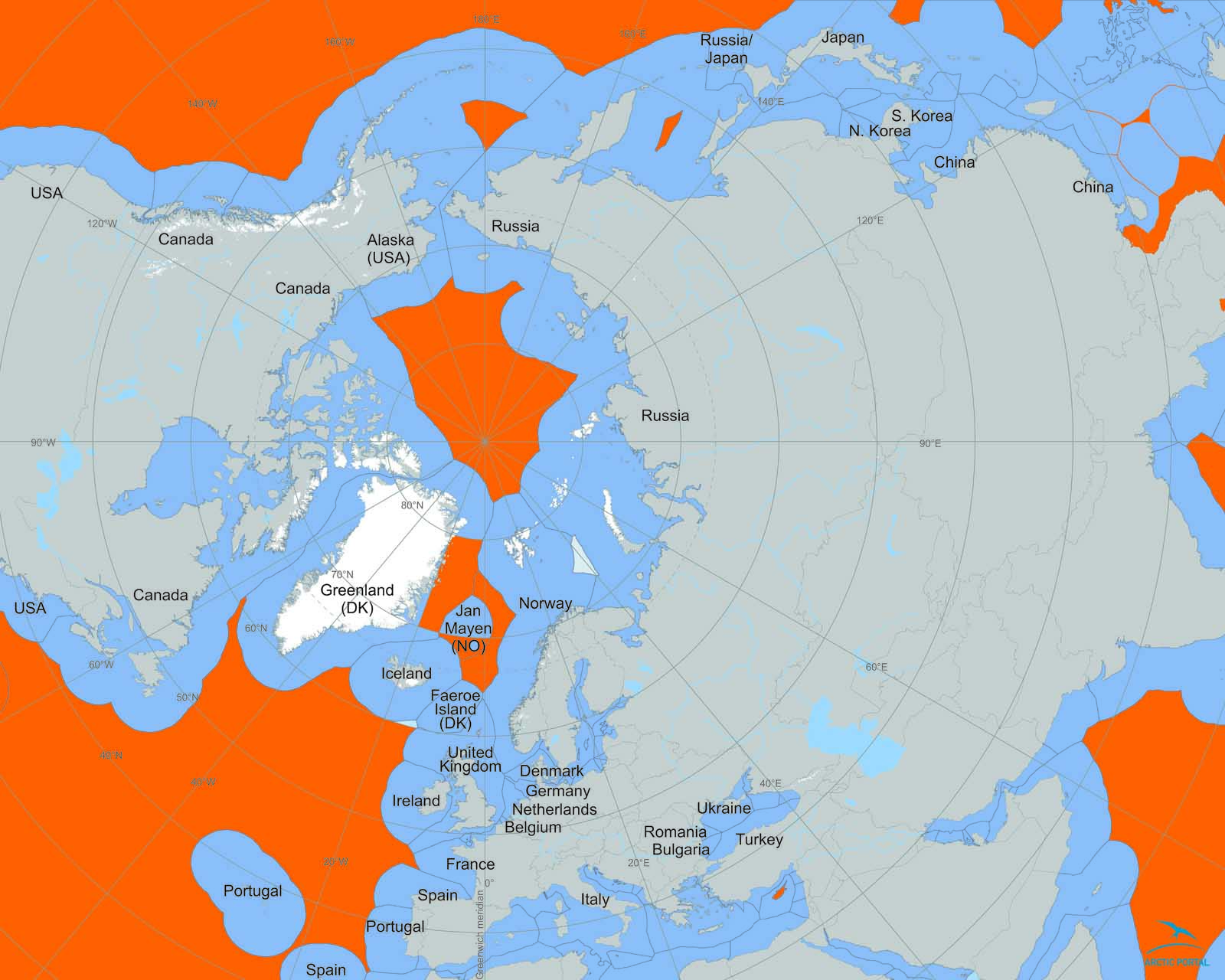
The fact is that no one owns the North Pole, but every country bordering the Arctic Ocean claims some of its parts.
The North Pole is covered by the thick layer of ice. The ice shelf is not considered land but water therefore it is governed by United Nations Convention on Law of the Sea (1982), signed by more than 150 countries.
The UNCLOS agreement allocates each nation control over the area up to 200 nautical miles (230 miles) of its cost and whatever natural resources can be extracted within this area.
This seemingly straightforward rule is complicated by another regulation that allows countries to extend their waters to up to 350 nautical miles (403 miles) if they can prove their underwater continental shelf extends beyond the normal 200-mile boundary.
So far, the Arctic Ocean has had a status of high seas, but after the discovery of the vast potential natural resources in the area, many Arctic states have started to re-evaluate their continental shelf.
When Russia planted a flag on the floor of the Arctic Ocean in August 2010, the country's aim was to show that a long ridge extends the Siberian continental shelf past Russia's 200-mile line, giving Moscow the rights to waters nearly all the way up to the North Pole. To do this, a nuclear-powered Russian ice-breaking vessel had to carve its way through the Arctic ice, and then dispatch two miniature research submarines down to the bottom of the ocean.
Of course, countries can't make formal claims just by planting a flag—they have to present scientific evidence demonstrating the size of their continental shelf to a U.N. Commission on the Limits of the Continental Shelf (CLCS) which then makes recommendations to coastal States.
Russia had appealed for more territory back in 2001, but the panel rejected the claim and requested more evidence. Part of the mission of the flag-planting Russian mini-subs was to gather data for a new petition.
What happens when countries' waters overlap? If the United Nations concludes that the lay of the seabed gives two countries rights to the same area, they can settle their boundary dispute independently or through a U.N. tribunal. So far, there haven't been any disputes like this in the Arctic, but researchers have yet to map the entire Arctic seabed. What's known of the topography suggests that Canadian waters may end up intersecting with those of Russia and Greenland.
Right now, the United States is the odd man out, legally, because it's the only country with Arctic interests that hasn't signed onto the Law of the Sea. (President Reagan refused the treaty because he thought it would hamper U.S. underwater mining.) While part of the UNCLOS has today customary international law status and the statements of the currents US leaders that the UNCLOS will be signed in near future, it remains to be seen whether the US reluctance to sign the treaty will have significant impact in the Arctic.
1974
First International Conference on Human Environment in Northern Regions
December. Sapporo, Hokkaido, Japan
 Hosted by Hokkaido Governor Naohiro Dougakinai, this inaugural conference brought together representatives from the Canadian provincial governments of Alberta, British Columbia, Manitoba, New Brunswick, Nova Scotia, Ontario, Saskatchewan, and Northwest Territories; United States state governments of Alaska, Idaho, Minnesota, North Dakota, Oregon, Washington, and Wisconsin; and representatives from the capital cities of Finland, Norway, and Sweden. The conference made evident a multitude of environmental, climactic, economic and social commonalities faced by residents in northern regions.
Hosted by Hokkaido Governor Naohiro Dougakinai, this inaugural conference brought together representatives from the Canadian provincial governments of Alberta, British Columbia, Manitoba, New Brunswick, Nova Scotia, Ontario, Saskatchewan, and Northwest Territories; United States state governments of Alaska, Idaho, Minnesota, North Dakota, Oregon, Washington, and Wisconsin; and representatives from the capital cities of Finland, Norway, and Sweden. The conference made evident a multitude of environmental, climactic, economic and social commonalities faced by residents in northern regions.
Participants at the conference came to understand that, as regions with similar climatic conditions, they shared many environmental challenges. They discovered that the way one northern region addressed a particular issue might apply to similar issues in many - if not all - northern regions. Government representatives realized that improved communication and cooperation could vastly enhance the way of life for all residents of the North. Furthermore, delegates acknowledged the value of holding regular meetings to discuss these commonalities. They vowed to work diligently as a whole on issues of shared importance.
During his closing address, Governor Dougakinai proclaimed, "It is earnestly desired that this three day-conference will produce fruitful results for the happiness of all peoples living in northern regions through the active exchange of views among the participants and that it will contribute to the promotion of friendly relations and to the social development of the entire region.
The seeds for the establishment of the Northern Forum were planted.
1979
Second International Conference On The Human Environment in Northern Regions
September, Edmonton, Alberta, Canada
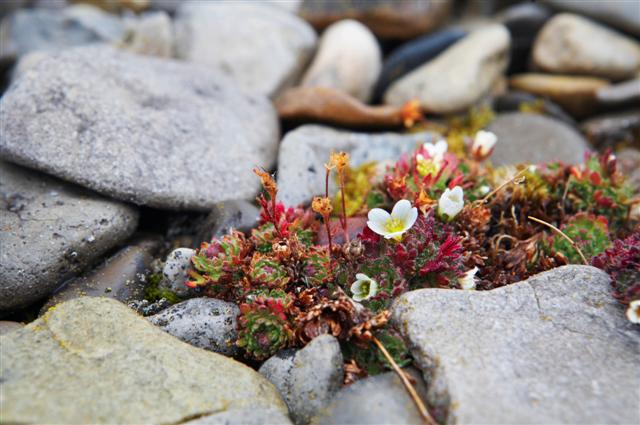
Participants determined that renewed vigor must be given to maintaining the balance among natural resource development, environmental protection and quality of life. Some governors worked to convey to each other that all might benefit from an organization which made it possible to act cooperatively to resolve seemingly intractable problems shared by those who live in Northern climates. Other regional leaders, preoccupied by their own immediate concerns and mandates, listened to these visionary suggestions.The Conference focused on human settlements. Specific sessions were held on: urban growth; the creation of new towns as a result of accelerated natural resource development; planning for the rapid expansion of existing settlements; and enhancing the livability of older towns and cities.Policy makers from twenty-two provincial, regional, and municipal governments gathered to address issues relative to improving the quality of life in northern regions. Peter Lougheed, Premier of Alberta, expressed hope at the opening ceremony that the exchange of information would extend beyond human environment issues to create a better understanding between different peoples inhabiting similar parts of the world. However, little was done beyond polite acknowledgement until 1990. A major part of the North, Russia's vast Northern Territories, were as yet unable to participate.
1990
Third Northern Regions Conference: Cooperation in a Changing World
September, Anchorage, Alaska, U.S.A.
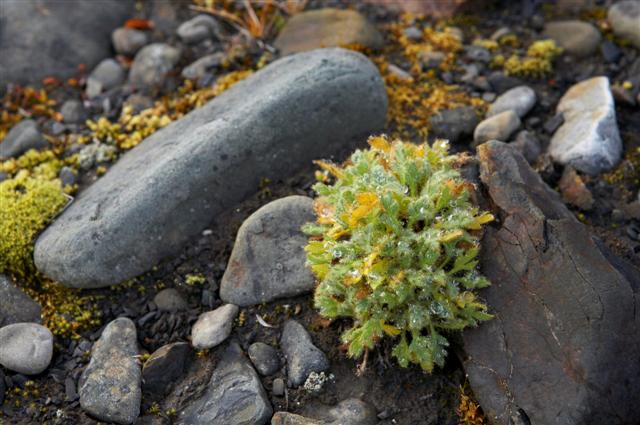 With the dramatic opening of the Soviet Union to the outside world, northern Russia provided the final piece of the puzzle in the movement to create a permanent "Voice of Northern Regions." Some 600 delegates to this third conference concluded that historical northern trans-border cooperation, largely sporadic and ad hoc in nature, was an anachronism. Participants recommended that a permanent regional organization by the name of the Northern Forum be established.This organization was intended to act as a mechanism "to improve the quality of local, national, and international decision-making regarding northern issues by providing a means through which northern voices can be heard at all stages of the process." Delegates also hoped that the Northern Forum would "offer opportunities to exchange ideas, solve common problems, and plan cooperative initiatives regarding issues that are unique to the North."
With the dramatic opening of the Soviet Union to the outside world, northern Russia provided the final piece of the puzzle in the movement to create a permanent "Voice of Northern Regions." Some 600 delegates to this third conference concluded that historical northern trans-border cooperation, largely sporadic and ad hoc in nature, was an anachronism. Participants recommended that a permanent regional organization by the name of the Northern Forum be established.This organization was intended to act as a mechanism "to improve the quality of local, national, and international decision-making regarding northern issues by providing a means through which northern voices can be heard at all stages of the process." Delegates also hoped that the Northern Forum would "offer opportunities to exchange ideas, solve common problems, and plan cooperative initiatives regarding issues that are unique to the North."
During the proceedings, several issues of common concern were identified as having priority within the scope of a northern regional organization's activities:
- Environmental assessment, monitoring and research.
- Pollution prevention and clean-up.
- Human resources, including culture, education, and health.
- Cooperative management of northern renewable natural resources.
- Northern technology and engineering.
- Physical infrastructure, including northern communications and transportation systems.
Furthermore, it was decided that the Northern Forum would locate its main office, or Secretariat, in Anchorage, Alaska.
Constituent Assembly of the Northern Forum
November. Anchorage, Alaska, U.S.A.


The Founding Protocol and Statutes of the North Forum Non-Profit Corporation were registered by the Alaska State Government of the United States of America on November 8, 1991, and the North Forum Non-Profit Organization Certificate was issued on November 29, 1991. The founding protocol consists of 11 articles and is signed by all founders - members of the Board of Directors of the Northern Forum. As this document shows, 13 representatives of northern regions from 8 countries: W.Hikel (Alaska, USA), T.Penikett (Whitehorse, Yukon, Canada), I.Yutreland (Tondheim, Novergia), F.Bierkan (Landsdelsutvalget, Bodo, Ussr) A. Krashakov (Chukotka, USSR), Zh.Tinong (Heilongjiang, China), D.Dagwasuren (Choibalsan, Mongolia), M. Suzuki (Sapporo, Hokkaido, Japan) adopted and signed the Charter of the Northern Forum.
1992
The Northern Forum Secretariat was established in Anchorage, Alaska, USA.

The first executive director of the Northern Forum from 1992 to 1995, Steve Shropshire
1993
The first General Northern Forum Assembly
October, province of Troms, Norway
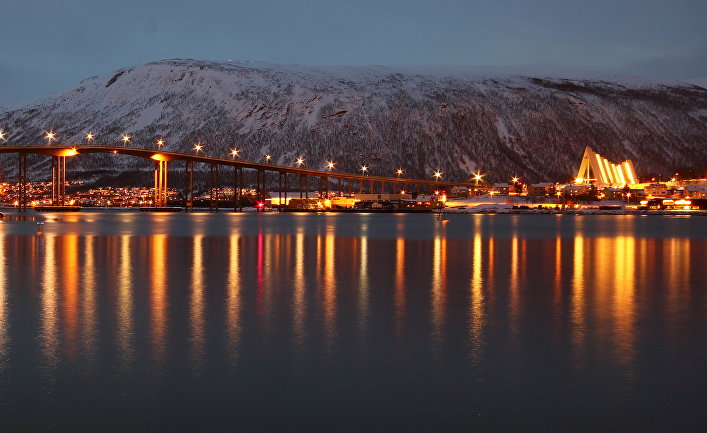
The I General Assembly signed and approved the Tromso Declaration. The Tromsø Declaration (Norway), adopted by the first General Forum of the Northern Forum in 1993, supported and joined the implementation of the principles of the 21st Century Agenda of the United Nations (Rio de Janeiro, 1992). Then for the first time the following areas of cooperation were identified: 1) Ecology of the North; 2) The Northern Sea Route; 3) Economic development; 4) Culture; 5) Science; 6) Cooperation of national and regional governments.
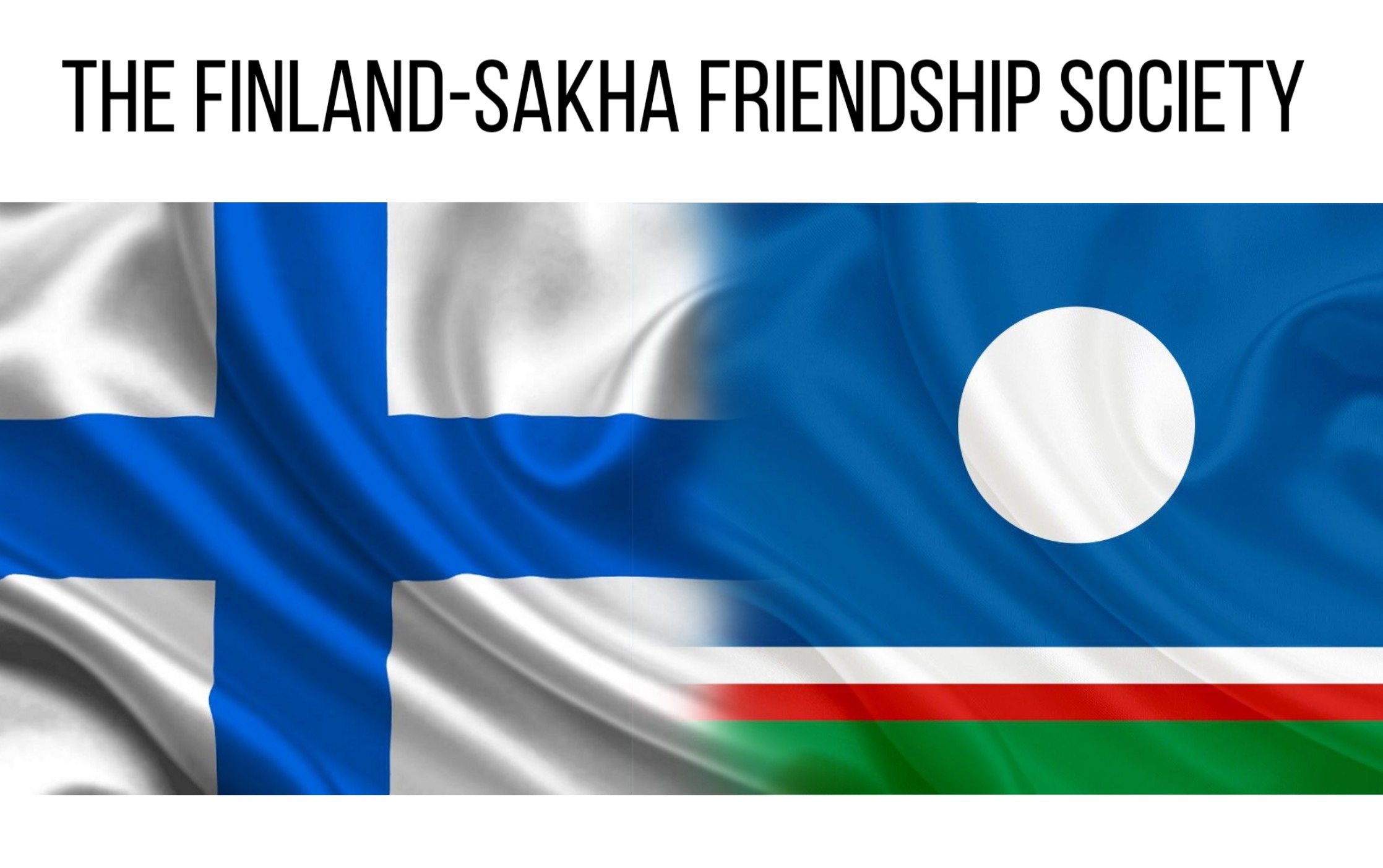
In 1993 The Finland-Sakha Friendship society was created. The goal was to promote the development of effective cooperation in the fields of culture, economics, and environmental protection.
Sakhalin Oblast is a member of the Northern Forum
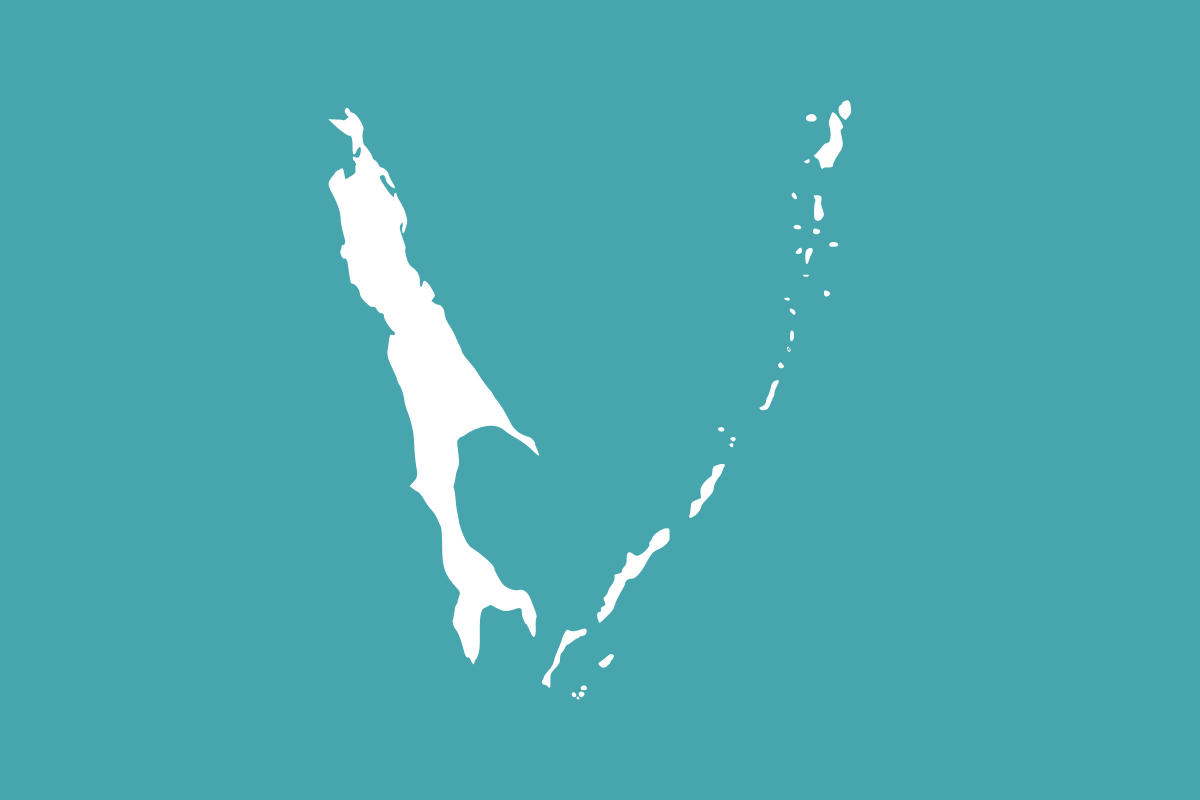
1993 – 2004 - Sakhalin Oblast is a member of the Northern Forum. During the membership period, the Sakhalin Oblast took part in all the main events and meetings of the Northern Forum.
1994
Walter Joseph Hickel became General Secretary of the Northern Forum 1997-2010

After the main Secretariat of the Northern Forum was opened in anchorage, Alaska, USA), branches of the Secretariat – in Bodo (Norway), in Rovaniemi (Lapland, Finland), in Yakutsk (Sakha Republic (Yakutia), Russia) and in St. Petersburg (Russia). In recent years, there have been two innovations in the structure of the organization concerning former presidents northern forum. Thus, in 1994 the post of General Secretary of the Northern Forum was introduced, in 2001 an Advisory Council was established. Mr. Walter Hickel became General Secretary. The Advisory Board automatically includes the former chairmen of the Northern Forum – W. Hickel, M. E. Nikolaev.
Northern Forum Academy established at the initiative of Northern Norway

1994 – 2009 – Alberta, Canada is a member of the Northern Forum.
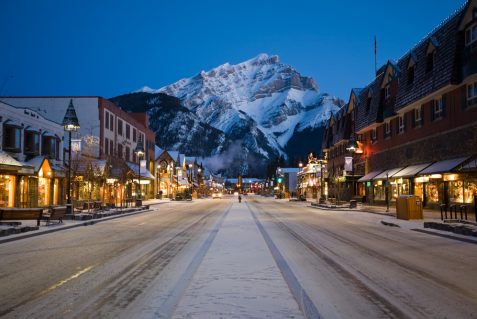
In January 1994, the organization was accredited to the United Nations as a non-governmental organization.

In January 1994, the organization was accredited to the United Nations as a non-governmental organization. In September of the same year, Mr. Hickel addressed the 47th Annual Meeting of the United Nations Division of Public Information of the Conference of Non-Governmental Organizations in New York (USA) and met with the Secretary-General of the United Nations, Boutros Ghali. In November 2002, M.E. Nikolayev, Chairman of the Northern Forum, President of the Republic of Saha (Yakutia) delivered a report "To develop and improve international humanitarian cooperation" at the 57th session of the UN General Assembly entitled "Strengthening of coordination in the field of emergency humanitarian assistance of the UN."
1996
The Northern Forum was granted an observer status in the Arctic Council.

The Northern Forum actively participates in the work of the Arctic Council as a permanent observer. Participation in the Arctic Forum allows the Northern Forum to conduct joint projects and be involved in interstate projects and programs.
Role of observers:
- Observers shall be invited to the meetings of the Arctic Council once observer status has been granted.
- While the primary role of observers is to observe the work of the Arctic Council, observers should continue to make relevant contributions through their engagement in the Arctic Council primarily at the level of Working Groups.
- Observers may propose projects through an Arctic State or a Permanent Participant but financial contributions from observers to any given project may not exceed the financing from Arctic States, unless otherwise decided by the SAOs.
- In meetings of the Council’s subsidiary bodies to which observers have been invited to participate, observers may, at the discretion of the Chair, make statements after Arctic states and Permanent Participants, present written statements, submit relevant documents and provide views on the issues under discussion. Observers may also submit written statements at Ministerial meetings.
First International Congress on Northern Farming
15-17 August, Republic of Sakha Yakutia, Yakutsk

At the II Circumpolar International Conference on Agriculture (Norway, 1995) and at the plenary meeting of the Northern Forum (Japan, 1995), the delegations of the Republic made a proposal on the need to consolidate the scientific and production efforts of all high-latitude countries in the development of northern agriculture on a planetary scale. The Government of the Republic of Sakha (Yakutia) has decided to hold the I International Congress on Northern Farming on 15-17 August 1996 in the city of Yakutsk.
Reindeer- breeding of the People of Arctic and North [Priority Project of the Northern Forum]
29 august 1996
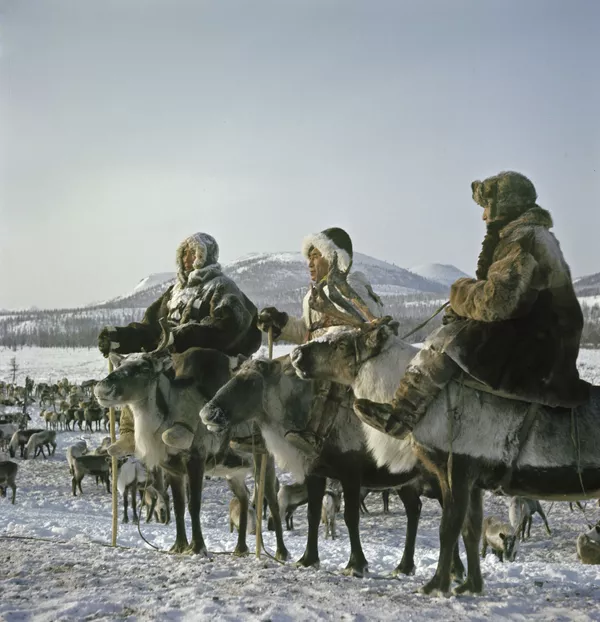
Detailes of the project:
- comporative researching reindeer-breeding cultures for search the way of survival;
- studying technology of keeping reindeer and exposure optimal form of management;
- search of effective methods of purchase, processing and realization of production of this branch of economy;
- creation World Informational Centre and bank of informations on reindeer-breeding;
- studying mutual relation domestic and wild reindeers;
- preservation genefond of valueable species and populations of reindeers;
- organisation scientific-production experimental stationary of the International Institute of the Reindeer-breeding in Yakutsk area.
1997
Canada is a member of the Northern Forum

1997 – 2003 Northwest Territories, Canada are members of Northern Forum
1998
The Secretariat of the Northern forum from Bodo (Norway) was transferred to Rovaniemi (Finland)
December, Rovaniemi, Finland
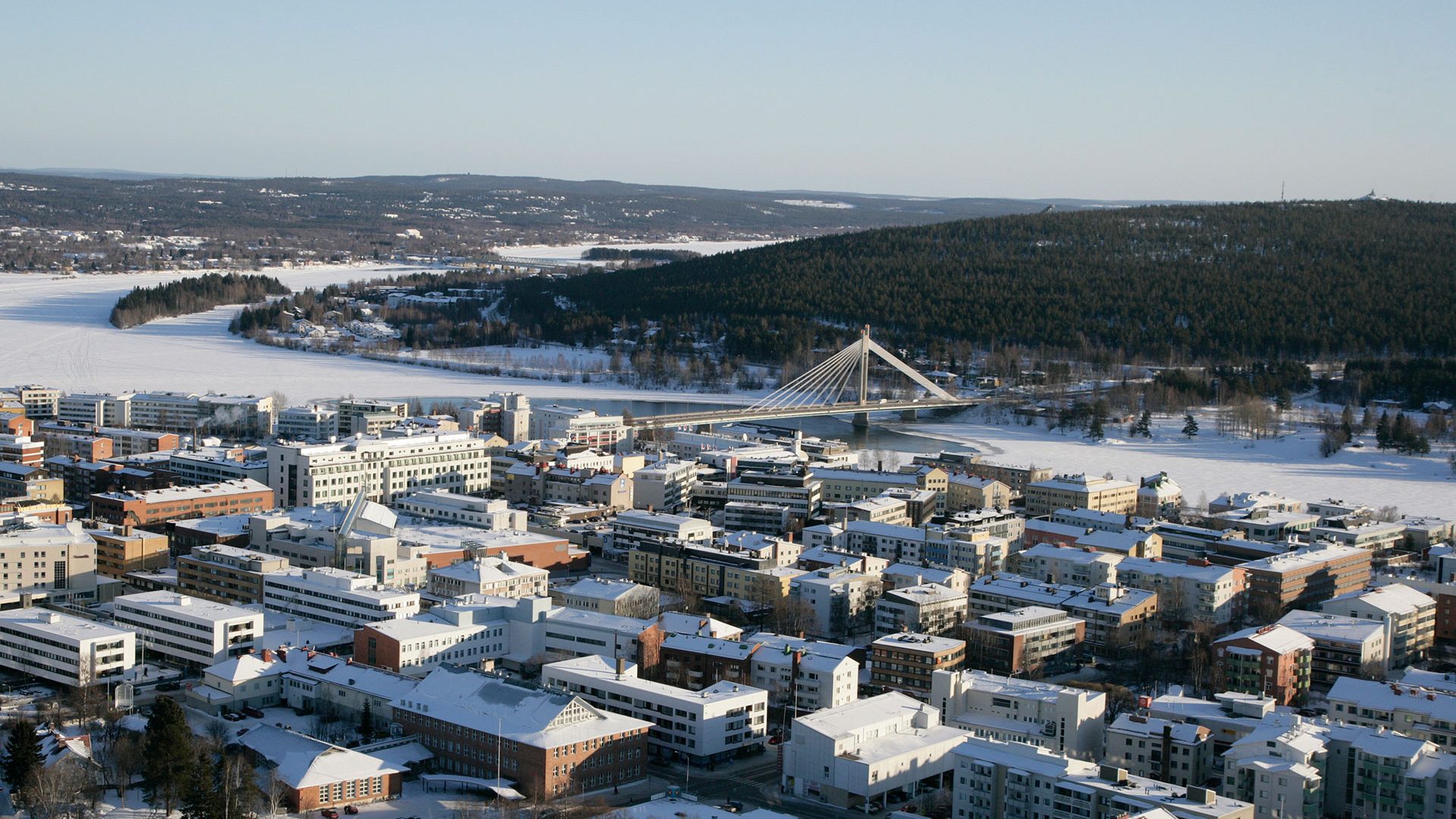
The executive director of the Northern Forum from 1998 to 2001, John Doyle
1999
Adoption of the resolution of the Northern Forum on the principles of tourism in the North.
June, Rovaniemi, Finland

In June 1999, during the lV General Assembly, a business conference was held in Rovaniemi (Lapland province, Finland). The conference included two seminars: international financing and tourism development in the North. The result of the conference was the adoption of the resolution of the Northern Forum on the principles of tourism in the North.
St. Petersburg became a member of the Northern Forum.
June 1999 - St. Petersburg became a member of the Northern Forum. Rovaniemi (Finland). The idea of opening the Secretariat of the Northern Forum in St. Petersburg in order to coordinate the activities of the Northern Forum in the North-Western part of the Russian Federation was supported.
2001
The executive director of the Northern Forum from 2001 to 2012, Priscilla Wohl
Membership of the Northern Forum covers 25 regions from 10 countries

Youth Eco-Forum
December, Edmonton, Canada
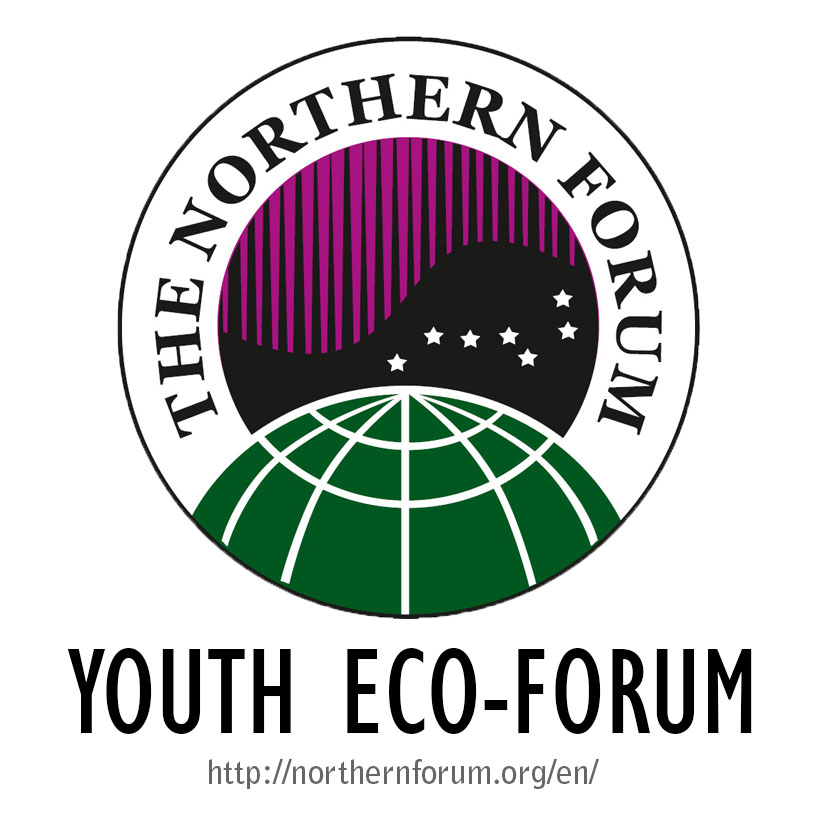
In cooperation with the Northern Forum, the Alberta government hosted the world’s first Youth Eco Forum, an international meeting of young people from northern regions, in Edmonton in December 2001. Twenty-five youth from Finland, Russia, China, Japan, the United States and Canada learned about common environmental issues and offered their suggestions for environmental action. As a result, the participating delegates developed a Youth Eco Declaration stating their specific concerns for the environment and identifying actions to be taken to respond to those concerns.
2003
International Environmental Action "Save and Preserve"

The International Environmental Action "Save and Preserve" is a large-scale socially significant environmental project, which has been implemented in the Autonomous District since 2003, since 2004 under the auspices of UNESCO and the International Association "Northern Forum." The aim of the project is to promote the sustainable development of the region through interregional and international cooperation in the field of environmental protection in order to ensure environmental safety and quality of life, and to develop an ecological culture of the population. The project helps to draw the attention of the general public to the environmental problems of the autonomous district and actively involve citizens in environmental and environmental education activities. A feature of this project is the variety of organizational forms and tools used to form ecological culture.
2004
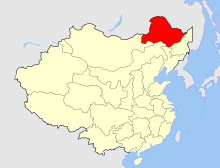
2004 – The intergovernmental agreement between Republic Sakha (Yakutia) and Heilongjiang Province (China) was signed.
2005
Business Advisory Council of the Northern Forum
March, Moscow, Russia

The Business Advisory Council Initiative Group met in Moscow in March 2005 and announced the establishment of the Northern Forum Business Advisory Council. In this regard, the Harbin Declaration in this direction reaffirmed its commitment to previous commitments and decided to expand work on northern tourism, including opportunity research, training, job creation; Expand the scope of the Northern Forum on Trade Facilitation, Business Exchanges and Partnership among North Entrepreneurs; Continue to partner with the business community.
Northern zoos cooperation
In June 2005, the Republic Sakha (Yakutia) initiated the “Northern zoos cooperation” project within the framework of the program “Environment”. It was adopted as a priority project of the Northern Forum at the VII session of the UN Assembly. Harbin, Heilongjiang Province (China). The goal of the project is to develop a system of zoo ties, expand international cooperation in the preservation of flora and fauna of the northern territories.
2006
Prevention of addictions

Alcohol and drug addiction prevailing in Russian northern regions and Alaska prompted the Northern Forum to establish the ‘Prevention of addictions” project. The group included experts from the northern regions: Vologda Oblast, Komi Republic, Republic Sakha (Yakutia), St. Petersburg, Khanty-Mansiysk and Chukotka Autonomous Okrug.
2006 – 2009 - Krasnoyarsk Krai is a member of the Northern Forum.
2007
2007 – Gangwon Province, South Korea is a member of the Northern Forum
2008
Infectious diseases monitoring

In 2006, the ICS Steering Committee established the working group on tuberculosis. The working group includes Greenland, Northern Canada, Northern Sweden, northern regions of Russia and the Arctic region of the United States (Alaska). In 2008 the Northern Forum joined the work with the new project "Infectious diseases monitoring". Currently, the project is based on medical facilities of member regions of the Northern Forum and specialists from the former member of the Northern Forum - St. Petersburg. Despite the fact that the project started with the expectation of coverage of common infectious threats, over time the focus shifted to the problem of tuberculosis; therefore, a working group of the Northern Forum of the same name was created.
Language program "Schools cooperation"
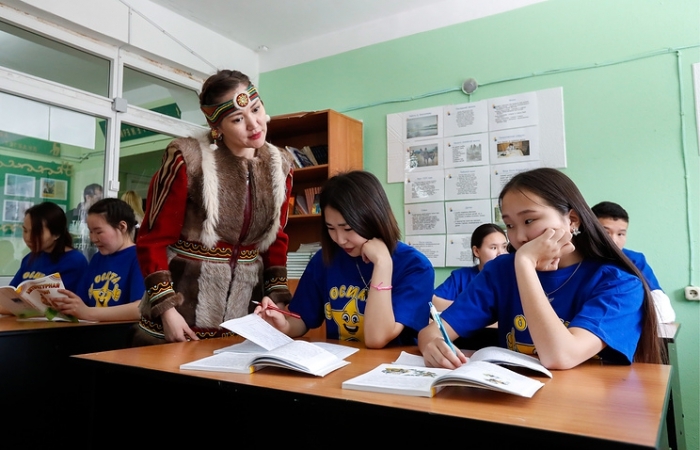
The project, conducted by the Republic of Sakha (Yakutia), is dedicated to the development of school partnerships in the North. The leading organization is the Yakutsk State National Gymnasium. It leads own project "School of Life in the North". Work on the project has been ongoing since 2008 and within its framework events such as international educational teleconferences, presentations, educational research projects for elementary school, meetings of students of twin cities etc.
2008 – 2012 – Nunavut is a member of the Northern Forum
2010
2010 – 2013 – Quebec is a member of the Northern Forum
2011
IUCN red list through the children eyes
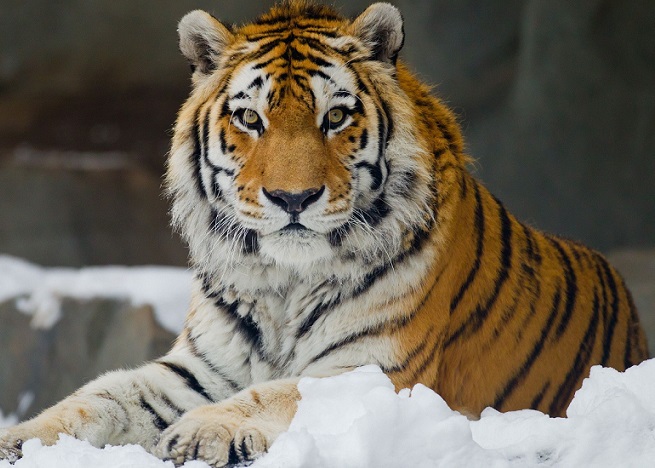
International project "competition-exhibition of children's creativity "IUCN red list through the children eyes" in the framework of the international ecological action "to save and preserve" led by the Northern Forum.
2012
Meeting Of the Committee of regional coordinators (CRC)
April, Quebec, Canada

The Northern Forum implements its main activities in the framework of 3 integrated programs: Sustainable development, Society, culture and the environment.
Development of protected areas
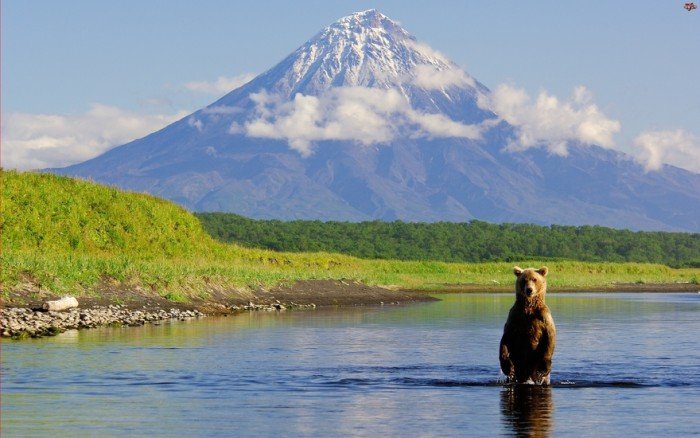
The “Development of protected areas” project began as a seminar in autumn 2012 in Yakutsk led by the Northern Forum Secretariat. Representatives the Republic of Sakha (Yakutia), Khanty-Mansi Autonomous Okrug, Sakhalin, Amur Regions; Krasnoyarsk, Trans-Baikal Territory; and foreign entities - members of the Northern Forum attended the seminar.
2013
The executive director of the Northern Forum Vladimir Vasilyev

The Northern Forum Secretariat was transferred from the Anchorage, Alaska to Yakutsk, Republic Sakha (Yakutia), Russia
January, Anchorage, Alaska, USA
Clarification of questions from the Secretariat of the Northern Forum from anchorage, Alaska to Yakutsk, RS(Y)
Meeting with the former Director and employee of the Secretariat, debt repayment
Telemedicine seminar
October, Yakutia, Russia

Kangwon delegation led by Dr. Kang with the Republican hospital 2
Meeting of project coordinators and business partners
November, Yakutsk. Russia

Participated working groups, located in the city of Yakutsk
Resolution No. 166 on approving the programs and projects of the Northern Forum for 2013-2015 was adopted.
2014
Participation in the meeting of the Arctic Council working group on sustainable development
March, Yellowknife, Canada
The project "Human in the Arctic" was presented on behalf of the Russian delegation. Information about the cooperation of the Northern Forum with the Arctic Council is presented.
Participation in the meeting of senior officials of the Arctic Council
Arctic Business Forum
March, Rovaniemi, Finland

Participation of Executive Director Vladimir Nikolayevich Vasilyev
International Conference "Renewable Energy in Isolated Systems of the Far East of Russia."
June, Yakutsk, Russia

X Youth Ecological Forum
August, Yakutsk, Russia

Participated delegations of: Khanty-Mansi Autonomous Okrug, Yamalo-Nenets Autonomous Okrug, Heilongjiang, Hokkaido, Republic of Sakha Yakutia. The forum was held jointly with "Sosnovy Bor"
Presentation of tourism potential of the Republic of Sakha Yakutia
September, San Diego, California, USA
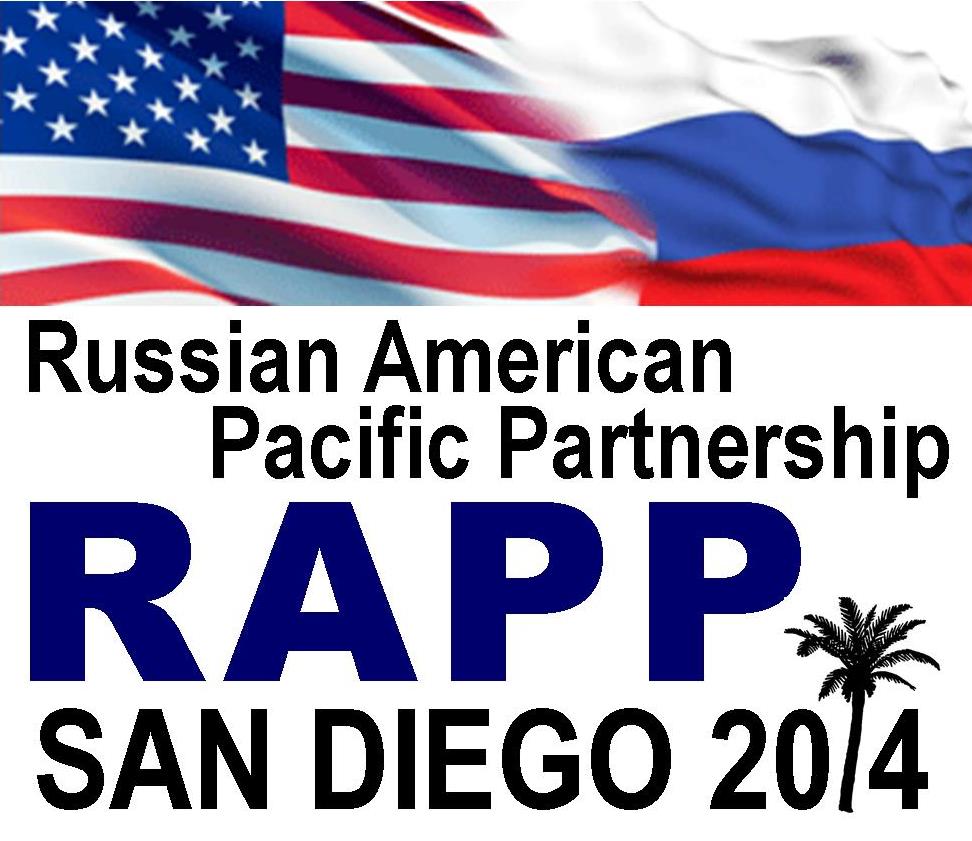
Working with compatriots abroad (USA)
Festival "Traditions of Northern Fisheries"
September, Lapland, Finland

Participated: Lapland, Khanty Mansiysk Autonomous Okrug, groups from the USA, Great Britain, Finland
Signed a cooperation Agreement with the Institute of the North of Alaska (Director N. Andreassen) and the Northern Forum (acting Director A. Bozhedonova)
November, Yakutsk, Russia


Goal: the renewal of the membership of the Alaska and Canadian regions in the Northern Forum
November, Yakutsk, Russia
Plenary session of the international conference "Arctic: perspectives for sustainable development”

The organizer was the government of the Republic of Sakha Yakutia and the Northern Forum
International Conference on Telemedicine
November, Naryan Mar, Nenets Autonomous okrug, Russia
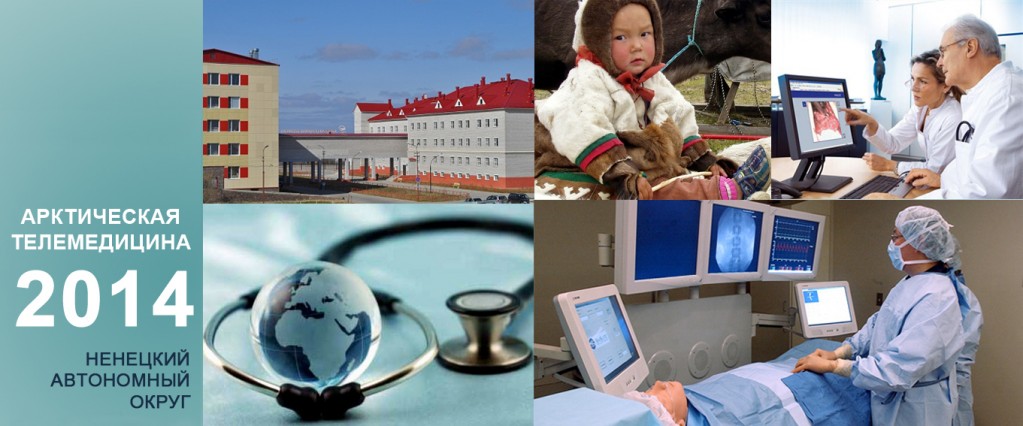
Participation in the international conference on telemedicine in Naryan Mar. Participants: NAO, KhMAO, Republic of Sakha Yakutia, Norwegian Telemedicine Centre, University of Arkhangelsk, University of Edinburgh.
An agreement on cooperation in telemedicine was agreed between the Ministry of health of Yakutia and the health Department of the Nenets Autonomous district
International Scientific and Practical Conference Arctic: Prospects for Sustainable Development
November, Yakutsk, Russia

Representatives of potential members of the Northern Forum participated together with the Government of the Republic of Sakha Yakutia. The conference was attended by representatives of federal authority of legislative and executive power and local government of subjects of the Russian Federation, leading scientific and educational institutions of Russia and foreign countries, public organizations.
2015
The executive director of the Northern Forum from 2015 to 2019, Mikhail Pogodaev

Project Festival "Brown bears and Indigenous Peoples"
March, Rural settlement Kazym, KhMAO, Russia

A festival was held on the project "Bears and indigenous peoples"
Initiated by - Khanty Mansiysk Autonomous Okrug with the participation of the business partner of the Northern Forum from Sweden
Krasnoyarsk Krai received the rotating chairmanship of the Northern Forum at the XII General Assembly in Yakutsk

Sulus LLC. based in St.Petersburg has joined the Northern Forum as a new business partner

Sulus LLC. operates since 2004 inhigh technology engineering in system intergration on the Russian IT Market and systems of industrial automatization. The Company specializes on completion of tasks in modern IT and industrial automatization that includes development of projects, their support in state expert bodies, application of system solutions and services in: oil industry, metallurgy, mining industry, heavy industry, ship building, energy and telecoms.
Northern Forum Acting Executive takes part in Arctic Council AACA Workshop
April, Saint Petersburg, Russia
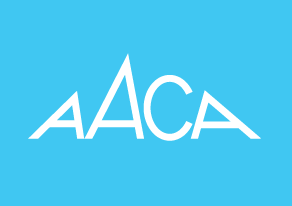
Northern Forum Acting Executive takes part in Arctic Council AACA Workshop. Adaptation Actions for a Changing Arctic Report (AACA) workshop took place in Saint-Petersburg, Russia on premises of the Arctic and Antarctic science research institute. The workshop took its place on April 13-16 and gathered authors and working group members on this project. Mikhail Pogodaev was invited as an expert to work on chapters 2 and 6. Agenda of the workshop included reports on status of preparation of chapters for this report, coordination of work of different author groups on these chapters. This workshop was meant to provide conditions for joint work of authors of chapters, determine needed materials and discuss main problems of report preparation, coordination of joint actions. Overall aim of AACA project is preparation and provision of the most full information for grounded, timely and responsible policy and decision-making in conditions of changing Arctic.
III International Conference "Development of Renewable Energy in the Far East of Russia
June, Yakutsk, Russia

The Conference "Development of Renewable Energy in the Far East of Russia" is a traditional summer event held jointly by the Government of the Republic and the Russian Joint Stock Company of the Energy System of the East.
The International Conference "Development of Renewable Energy in the Far East of Russia" allows manufacturers of energy equipment and representatives of scientific organizations to demonstrate their technological solutions and initiatives for the development of renewable energy sources. The event also included a dialogue with representatives of state authorities concerning the regulation of the industry and instruments of state support for alternative energy. The conference initiated several major cooperation projects:
- Within the framework of the agreement signed at the first conference with the Government of the Republic of Sakha (Yakutia) "Russian Joint Stock Company of the Energy System of the East." built the largest polar SES in the world in Batagai;
- Japanese government organization NEDO with the Government of Kamchatka Krai and "Russian Joint Stock Company of the Energy System of the East" built a unique wind power complex in Ust-Kamchatsk.
Regions: Yakutia and Gangwon Province (South Korea)
Meetings of the Presidium of the Arctic and Antarctic Council under the Federation Council of the Federal Assembly of the Russian Federation with members of the State Commission for Arctic Development
November, Yakutsk, Russia

Governors of the constituent entities of the Russian Federation, which are part of the Arctic zone of the Russian Federation, took part. As a result of the meeting, the minutes of the meeting were adopted, which there is a paragraph on participation in international Arctic forums of the constituent entities of the Russian Federation and municipalities that are part of the Arctic zone of the Russian Federation.
2016
4th meeting of the Norwegian-Russian working group on cross-border and regional cooperation of the Russian-Norwegian intergovernmental commission on industrial, economic and scientific and technical cooperation
January, Kirkenes, Norway

At the meeting, the Russian delegation was headed by Alexander Tsybulsky, Deputy Minister of economic development of the Russian Federation, and the Norwegian delegation was headed by the State Secretary, Deputy Minister trade, industry and fisheries of Norway, Dilek Ayhan.
The Northern Forum is an observer in the Arctic Council
April, Iqaluit, Canada

Participation at Arctic Council Ministerial Meeting
2016
Arctic Circle Assembly
October, Reykjavik, Iceland

The Assembly held an official signing ceremony of the agreement on Lapland's entry into the Northern Forum. At the ceremony among others was also attended by Advisor on Arctic policy Alaska Governor Craig Fleener and the Mayor of Akureyri Eirikur Bjorn Bjorgvinsson.
Lapland officially joined in the Northern Forum

In Reykjavik, within the framework of the Arctic Circle International Forum, a ceremony was held to sign an agreement to renew Lapland 's membership in the Northern Forum. The Nordic Forum is an international organization of northern heads of regions that has been active since 1991 as a forum for the exchange of best practices among northern Governments in the sustainable development of northern regions and the improvement of the quality of life of the peoples of the North. In its time, the organization united more than twenty northern territories governments, including Alaska with Lapland.
Alaska signs agreement to return to Northern Forum
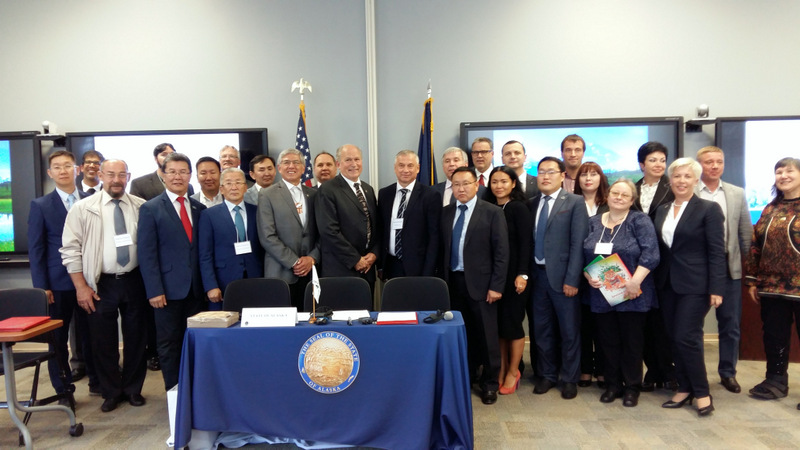
On July 25-27, 2016, a meeting of regional coordinators of the Northern Forum was held in Anchorage, Alaska, USA. In a speech at the signing ceremony of the Northern Forum accession agreement, Alaska Governor Bill Walker said of the importance of regional cooperation with Russian regions: "I am proud to be the Governor of Alaska. I was personally familiar with Mr. Walter Hickel (founder of the Northern Forum, Governor of Alaska in 1966-1969 and 1990-1994), who many years ago, having brought me to the globe, said: "All Arctic regions and countries must jointly solve common tasks."
Official visit of the delegation of the Kingdom of Norway headed by Ambassador extraordinary and Plenipotentiary Leidulv Namtvedt
November, Yakutsk, Russia
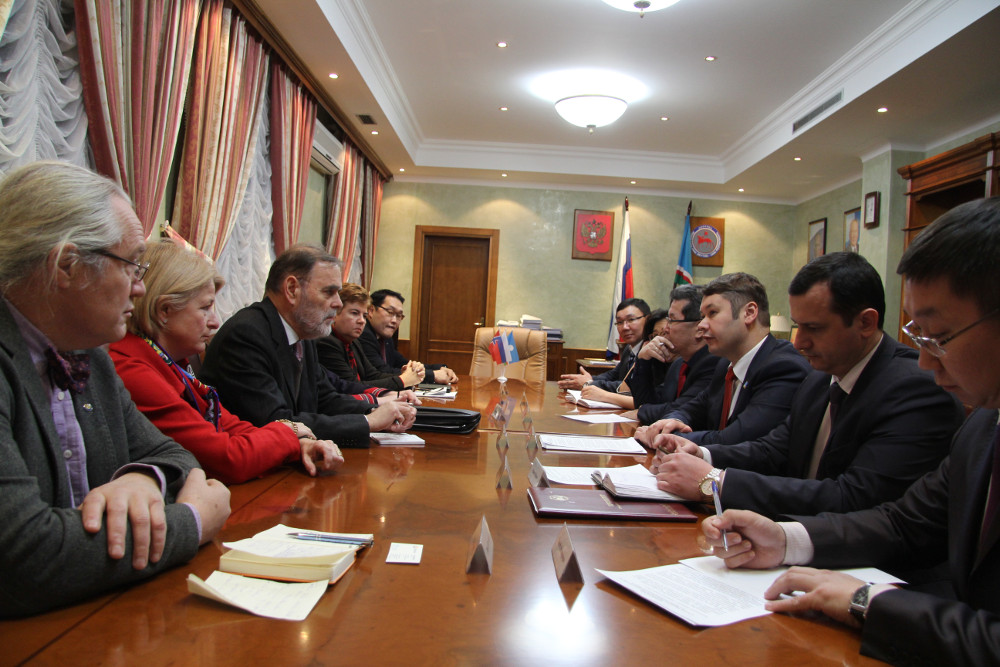
The Northern Forum took part in organizing the delegation's visit Kingdom of Norway together with the Ministry of Federal Affairs relations and external relations of the Republic of Sakha (Yakutia), the international center of reindeer husbandry and the North-Eastern Federal University. M. K. Ammosova. The purpose of the visit was to strengthen contacts with universities and research institutes, as well as explore opportunities for trade and economic ties.
2017
4 organisations joined the Northern Forum business partnership
Business partnership in 2017, 4 organisations joined the Northern Forum business partnership: Arctic Portal (Akureyri, Iceland), "Arctic Communications Business" LLC of Ukpeak vik Iñupiat Corporation (UIC) (Alaska, USA), Ltd company "Smik-Master. Polygraphy "(Republic of Saha (Yakutia), Russia), "Energy saving technologies" LLC (Republic of Saha (Yakutia), Russia)
2018
A New Northern Forum Strategy

On 11-12 April 2018, XIII General Assembly of the Northern Forum will convene in Krasnoyarsk, Russia. It is an international organization that brings together Arctic and Northern regions to improve the quality of life of all people living in the North and enhancing the principles of Northern territories sustainable development. The Northern Forum has a 26 year long and rich history of pioneering the regional international cooperation in the Northern hemisphere. For several decades the Northern Forum has been successfully implementing initiatives and projects that benefit Northern and Arctic areas of the world, and has been effectively serving as a regional voice in the global arena on current Arctic and Northern agenda. Biennial General Assembly gives an opportunity to assess Forum’s work and to acknowledge achievements and successes made during last two-year period. Since the XII General Assembly of the Northern Forum, held in Yakutsk in November 2015, the Forum has significantly grown thanks to the strong leadership of Executive Director Mikhail Pogodaev and his secretariat staff, the member regions support and that of organizations involved in implementation of its mission.
2019
The executive director of the Northern Forum Daryana Maximova

Arctic Summer School

On July 29, the Arctic Summer School, a joint university educational project - the Northern Forum and the Korean Maritime Institute - was organized at Northeastern Federal University. Within three weeks, participants from Russia, South Korea, Germany and other countries attended lectures by leading scientists and experts on Arctic development.
Northern Sustainable Development Forum
September 24-28
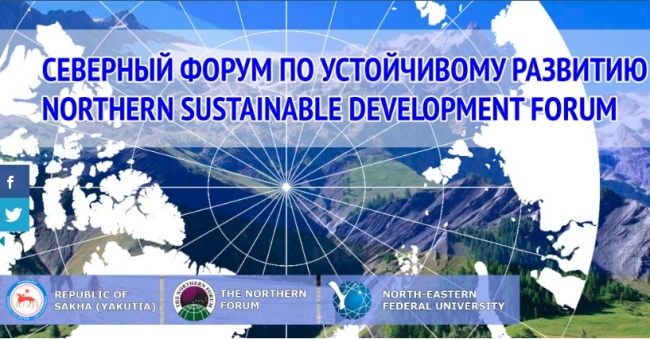
The Northern Forum on Sustainable Development is held for the first time in Yakutsk from 24-28 September 2019. A total of 130 guests, including 50 foreign guests, from 13 countries, including circumpolar countries and 3 countries of North-East Asia (China, South Korea and Japan) came to the forum. To discuss issues on sustainable development of the North during these days there were events on 40 platforms, in the format of panel discussions, round tables, conferences, master classes, vorkshop, lectures and presentations of projects. Such topics as cooperation between Russia and Asia, sustainable development of Arctic regions and cities, economic, social and political problems were discussed; The problems of the small indigenous peoples of the North. The Northern Forum on Sustainable Development in Yakutsk will be a platform for developing concrete measures to solve global problems related to the development of the North and the Arctic. And the Northern Forum on Sustainable Development will be held annually in Yakutia.
The Northern Forum is a non-profit organization (registered with 501(c)(3) status in the United States), which means the organization has no commercial activity and depends on membership fees, donations and grants to finance its operations.
Donations are encouraged to help the Northern Forum provide Northern regions the opportunity to share their knowledge and experience, and to support sustainable development and environmental initiatives to improve the quality of life of Northern peoples.
If you wish to make a donation to the Northern Forum, your donation is tax-deductible in many countries. The following levels are available:
- $ 50
- $ 100
- $ 200
- $ 500
- $ 1000
Corporate sponsorship available: consult us at
You can make a donation by mailing us a check, sending us a fax with your credit card information, or making an online credit card payment.
We accept VISA, MasterCard, American Express, Diners, and Discover. Only U.S. and Canadian credit cards are accepted on-line. Use the fax form for the above cards through other foreign countries. Your personal information is kept secure and confidential.
The idea of creating an organization of northern regional governments was raised in 1974 by the government of Hokkaido, Japan, during the first of a series of international conferences on northern issues. The Northern Forum developed from a Northern Regions Conference held in 1990 in Anchorage, Alaska, attended by more than 600 delegates from 10 countries. The Forum was formally established in November 1991.
- Donate by mail
- Donate by Fax
- Donate Online
As the dangerous infectious diseases kept spreading across the North, the damage from this made the international community to pay more and more attention to this problem. In 1998, an Arctic Council SDWG project called ICS was launched as a joint response to threat of the infection. This project was meant to be a circumpolar epidemic surveillance body.
Next decade brought TB to the scope of infections in the North, as its severity was growing higher. This circumstance pushed more regions to join international cooperation. In 2006 ICS has launched a tuberculosis working group. This working group consists of members from Canada, Northern Sweden, northern regions of Russia and the Arctic region of the United States (Alaska). In 2008, the Northern Forum has joined with a new project called “Infectious diseases Circumpolar Surveillance Network”.
Currently this project is implemented by participating organizations from member regions, accompanied by specialists from ex-members of the Northern Forum – State of Alaska and Saint-Petersburg. Despite this project was initiated with aim to cover all types of infectious threats, its focus has moved with time to the TB issue, what later launched the separate Northern Forum working group.
Currently, this project has:
- A determined set of aims and tasks for the TB Working Group
- An executive body of the Working Group and its plan of research
- A TB Working Group that engages practically all Circumpolar states in its activity
- Settled core questions on composition of the international TB database and a position on data transfer between the participants of the WG.
- Formulated an aim for joint research on study of TB in the Northern territories.
- To develop data transfer protocols and provide adequate security measures
- To carry out a retrospective research on TB infection cases for the last 5-6 years
- To build an algorithmic-mathematic model of development of TB epidemiologic process in the Circumpolar North regions.
- To execute international moderation of events dedicated to lower acuteness of the TB epidemiological situation in the Circumpolar North, with an accent on the Indigenous peoples of the North
Core aims for the TB WG for 2014-2015 and in perspective:
Secretariat recommendations:
Under Khanty-Mansiysk chairmanship:
- To elect members of the Working group.
- To outline a working plan for the following 2 years and forward it to the Secretariat no later than 18th of January 2014.
- To hold a seminar in Russia in 2014 to determine opportunities for extension of interregional participation in the project to continue cooperation with the Arctic Council on this project.
- To present a report to the RCC in 2014.
Lead region: Khanty-Mansiysk
Participants:
Sakha - Kravchenko Alexander Fyodorovich, Director for the State Budget Organization of the Sakha Republic, NPC “Phtisiatria” +79246609902 ;
Vinokurova Mariya Konstantinovna, Deputy Director for the State Budget Organization of the Sakha Republic, NPC “Phtisiatria” +79644239494
Welcome
You have successfully logged in to the Intranet.
You now have access to all the members area content available under the Intranet menu item
The Northern Forum is a non-profit, international organization composed of fourteen sub-national or regional governments from five northern countries.
Green shows the current NF regions.
The Northern Forum Regions include:
Leading region: Sakha
CONTACTS: Safonov Luka Nikolayevich, Orto Doidu Zoo Director, Safonova Natalia Vladimirovna, Orto Doidu Zoo Deputy Director; , +7(4112)22-52-59
This project was started to unite the Northern Zoos for joint salvation of common problems of keeping a zoo in the North and in perspective to establish an animal exchange. The project unites large regional-scale zoos that are able to keep a variety of animals including rare and endangered species. Maintaining and supporting those animals often is too complicated and expensive for the smaller zoos, so international cooperation in this field appears as necessary for their conservation.
Many international organizations and affiliations work within the Northern Forum´s community to make the Northern regional affairs and issues stronger. Most of these organizations are public but the community also includes associations of common stakeholders. All of them have though one thing in common; to promote Northern affairs.
Inter – governmental (IGOs) and non - governmental organizations (NGOs) have assumed an important role in the development of regional Northern cooperation.
Below is a list of international organizations in the North.
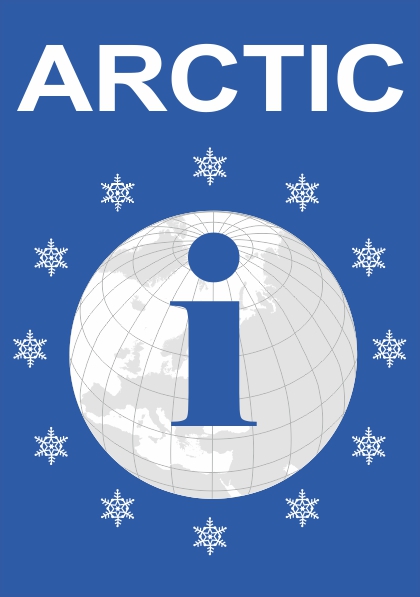 |
 |
 |
 |
 |
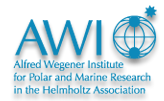 |
 |
 |
Partnership
United Nations NGO Branch
 The Department of Economic and Social Affairs of NGO Branch is the focal point within the UN Secretariat for non-governmental organizations in consultative status with the Economic and Social Council (ECOSOC) and for NGOs seeking status. Our aims are the following:
The Department of Economic and Social Affairs of NGO Branch is the focal point within the UN Secretariat for non-governmental organizations in consultative status with the Economic and Social Council (ECOSOC) and for NGOs seeking status. Our aims are the following:
Support to NGOs: Informing you in a timely fashion on events and opportunities to collaborate with the United Nations.
Intergovernmental Support: We service the Committee on NGOs, which meets twice a year to discuss accreditation of NGOs to the UN Economic and Social Council.
Conference registration: Through CSONet, we facilitate participation of NGOs to most of the intergovernmental processes taking place at United Nations headquarters and beyond. Each year, some 7,000 NGO representatives participate in those events in New York alone.
Technical assistance: With support from the UN Development Account, we carry out limited capacity-building activities with civil society organizations.
The Northern Forum has an Observer status.
Arctic CouncilThe Ottawa Declaration of 1996 formally established the Arctic Council as a high level intergovernmental forum to provide a means for promoting cooperation, coordination and interaction among the Arctic States, with the involvement of the Arctic indigenous communities and other Arctic inhabitants on common Arctic issues, in particular of sustainable development and environmental protection in the Arctic. |
|
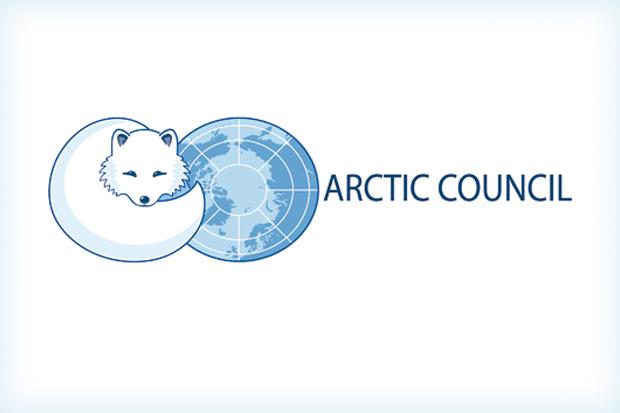 |
Arctic Council Member States are Canada, Denmark (including Greenland and Faroe Islands), Finalnd, Iceland, Norway, Russian Federation, Sweden and the United States of America. ] In addition to the Member States, the Arctic Council has the categories of Permanent Participants and Observers. The Northern Forum has an Observer status. http://www.arctic-council.org/index.php/en/about-us/arctic-council/observers |
Cooperation AgreementsUniversity of the Arctic (Uarctic) |
|
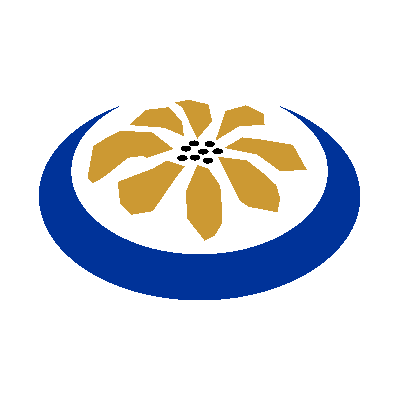 |
The University of the Arctic (UArctic) is a cooperative network of universities, colleges, and other organizations committed to higher education and research in the North. Our members share resources, facilities, and expertise to build post-secondary education programs that are relevant and accessible to northern students. Our overall goal is to create a strong, sustainable circumpolar region by empowering northerners and northern communities through education and shared knowledge. The University of the Arctic promotes education that is circumpolar, interdisciplinary, and diverse in nature, and draw on our combined strengths to address the unique challenges of the region. The University of the Arctic recognizes the integral role of indigenous peoples in northern education, and seeks to engage their perspectives in all of its activities. |
|
United Nations Development Program & Forum of regional governments and global associations of regions (FOGAR) 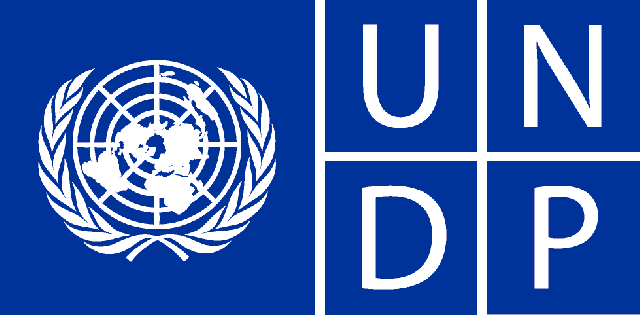
Letter of Agreement between UNDP, Northern Forum and FOGAR was signed on September 12, 2007 within the VIII NF General Assembly in Khanty-Mansiysk, Khanty-Mansiysk Autonomous Okrug-Yugra, Russia.
http://www.regionsunies-fogar.org/en/index.php
|
|
|
|
|
| Non-Profit Partnership Center for the Preservation of Cultural and Historical Heritage “Electronic Memory of the Arctic” (EMA Project) | ||
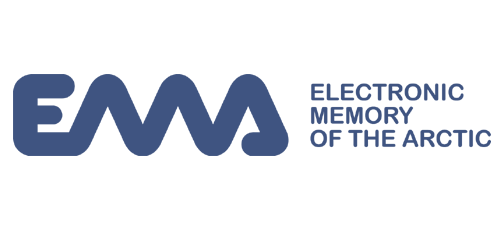 |
The cultural heritage of the Arctic, the history of the exploration of the Arctic and the life of the region’s inhabitants are highly important. However, these can often be hard to restore, because the information resources are rare and incomplete, have different formats and languages and is spread across many countries. Addressing this challenge, many national libraries and archives are digitalizing their collections in order to preserve them for the coming generations. The project“Electronic Memory of the Arctic (EMA)” aims to bring such electronic resources together, encompassing all the Arctic states.
|
|
|
The EMA project has been designed to accumulate, digitalize, preserve and provide free access to the cultural and historical resources related to the circumpolar world, currently stored in different formats in national libraries, archives, museums and private collections. The project team has already established the technical framework for an easily accessible and searchable database, using state-of-the-art digital technologies. Memorandum of Understanding and Cooperation betwee EMA and the Norrthern Forum was signed on October 18, 2013 within the XI NF General Assembly in Moscow, Russia. |
||
Cooperation with national leaders
In order to show the value, and improve the effectiveness, of the Northern Forum's region-to-region approach to international relations, the leaders of the Forum have engaged in dialogue with many national leaders from the Forum's member regions. Such contacts raise awareness of the Northern Forum, and its mission and activities. More importantly, they also indicate that this approach, in cooperation with national leaders, can produce practical results for Northern peoples.
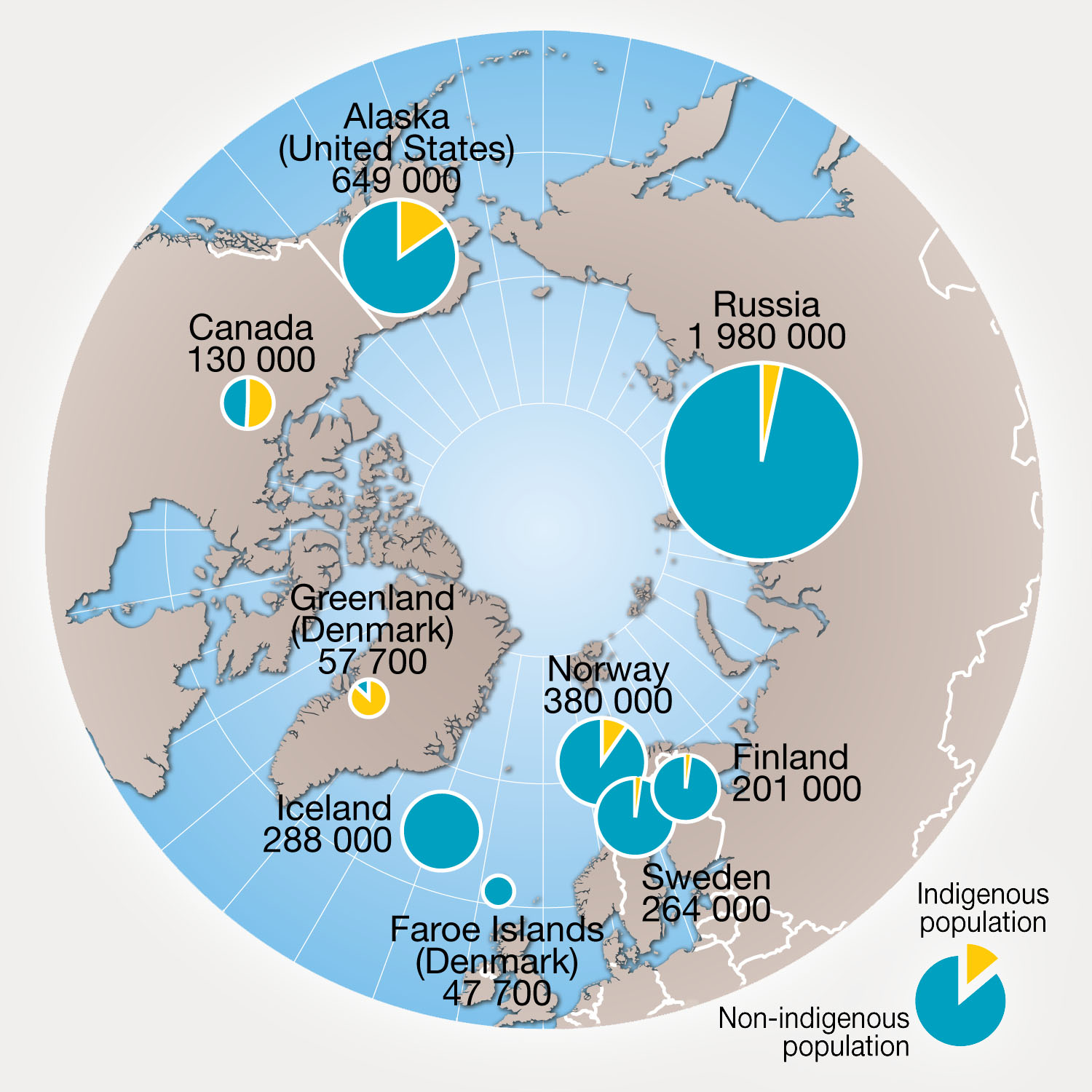
The Arctic covers 40 million square kilometers or approximately 8% of the Earth´s surface, but hosts a population of only 4 million. Of the 4 million, various small groups of indigenous people, peoples who occupied the area long before the people of European tradition came, can be found.
Almost all of them live today as a minority within the borders of contemporary nation states.
Only in Greenland, the indigenous are in majority as they account for 88% of the entire population. In the same time half of the northern Canadian population is indigenous.
In Scandinavia and north-Russia, indigenous peoples are only a small fraction of the population or around 4-5%, Alaska having an indigenous population of around 20%.
Despite that some 40 indigenous languages are still spoken in the Arctic, Russian, English and Scandinavian languages are the most dominant languages today. Only in Greenland is Inuktitut, an indigenous Inuit language, the only official language of the region. In addition, Canada recently approved Nunavut's proposal to declare Inuktitut, English and French the official languages of Nunavut.
There have been inhabitants in the Arctic for at least 12.000 years according to bones found in Russia. Some believe people have lived up North for much longer or up to 30.000 or 40.000 years, no-one knowing for sure.
 Little is known about the earliest people from 12.000 years ago, but the culture and livelihoods of the Inuit and the Saami, from around 4500 years ago, are better known and archived. The first Inuit, the Paleo-Eskimos, emigrated from Asia to Alaska crossing over the Bering Strait.
Little is known about the earliest people from 12.000 years ago, but the culture and livelihoods of the Inuit and the Saami, from around 4500 years ago, are better known and archived. The first Inuit, the Paleo-Eskimos, emigrated from Asia to Alaska crossing over the Bering Strait.
They lived off the land, hunted seals, walrus and perhaps even whales also hunting reindeers and musk oxen, birds and polar bears. Around 2500 years ago life shifted slowly but surely while the Arctic got colder. The Paleo-Eskimos gave it away for the Dorset Culture. The Dorset people stretched skins over a simple wooden framework to make kayaks and tents. Stones held down the skins on the tents but in the cold hard winters, they lived in caves, turf houses or snow houses. For food, they hunted whales as big as beluga and narwhal.
This culture lived for around 2000 years, when the Thule people became the new tradition. They are the forerunners of the modern Inuit. The word Inuit means The People and is plural, while Inuk is a single person. Eskimo on the other hand is considered derogatory as a name for Inuit's, as in Inuktitut Eskimo means "eaters of raw meat".
Like their processors, Inuit used tents made out of skins and wore skin for clothing. These are traditions Inuit are proud of and even today, in 2011, they wear clothes like their ancestors.
Inuit's developed extensive hunting skills in the Arctic using harpoons with a handle and a rope attached to it to kill seals and whales. That way the pray did not sink when killed, or wounded. Inuit used dogsleds (at first wolf sleds) to move around and to hunt. They used a bow and arrow and shot polar bears and other animals. Inuit's trusted on caribou and whales to migrate, if they did not their price was starvation.
The Saami originated from the Urals in Asia, like so many tribes from the area. They have inhabited the northern Arctic and sub-Arctic regions of Fenno-Scandinavia and Russia for at least 5000 years living off of the reindeer husbandry and fishing.



